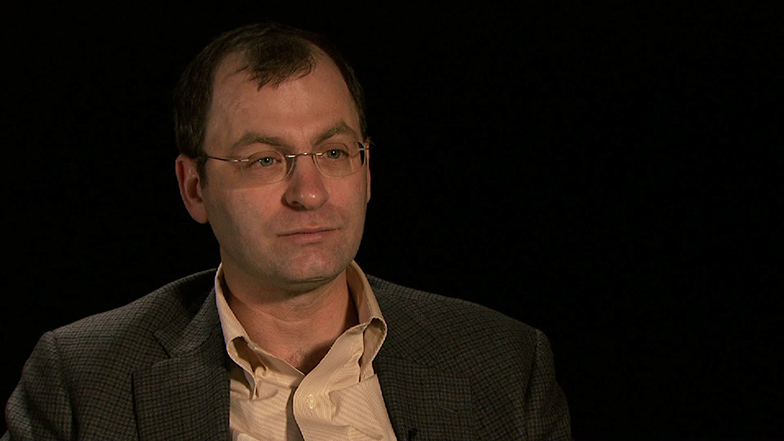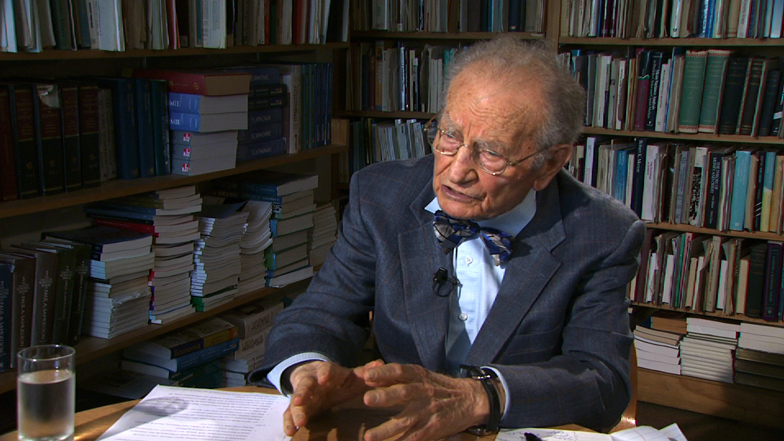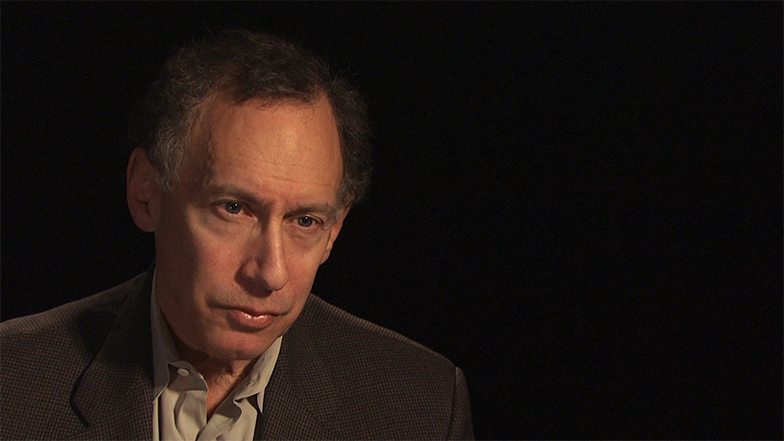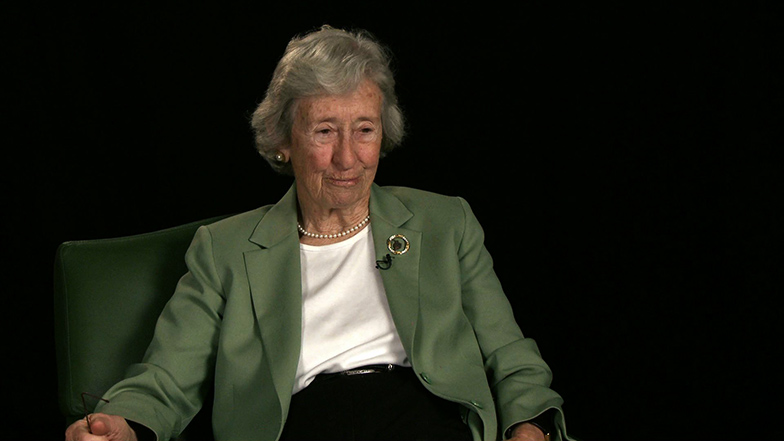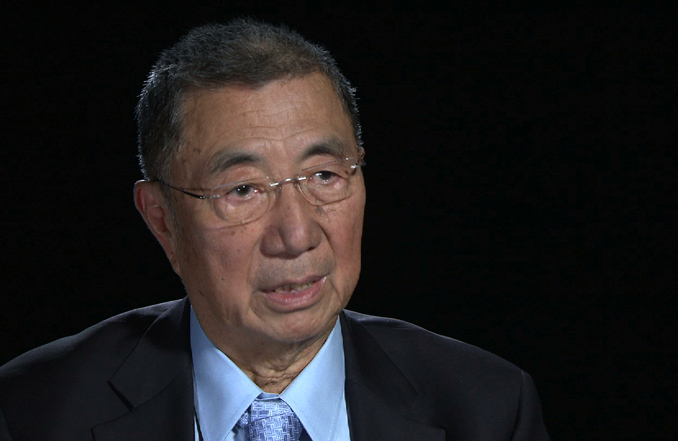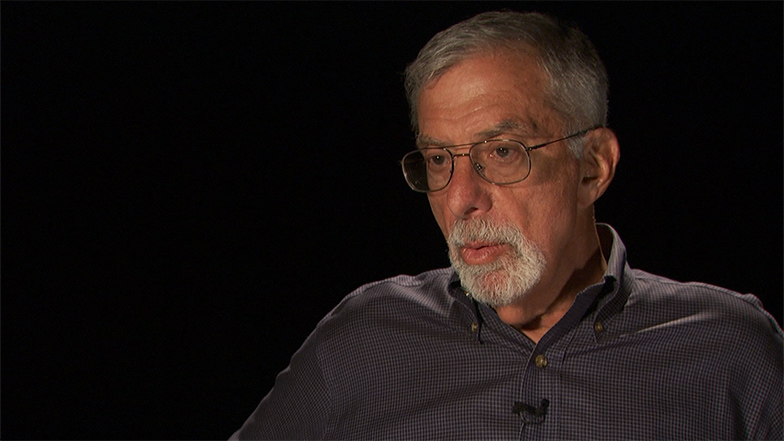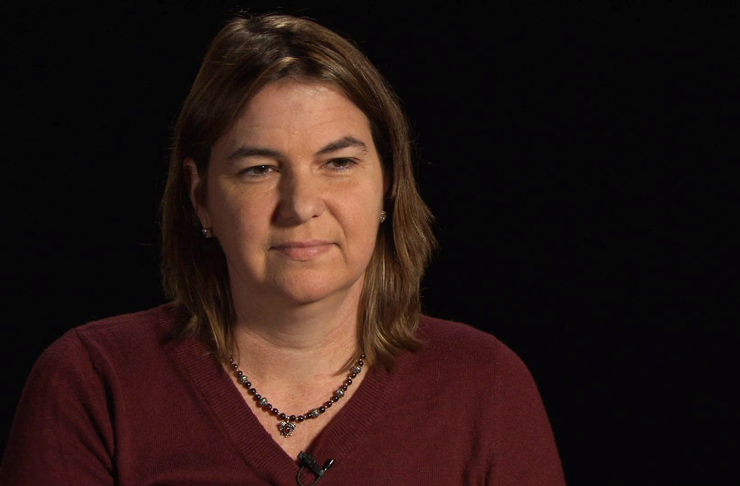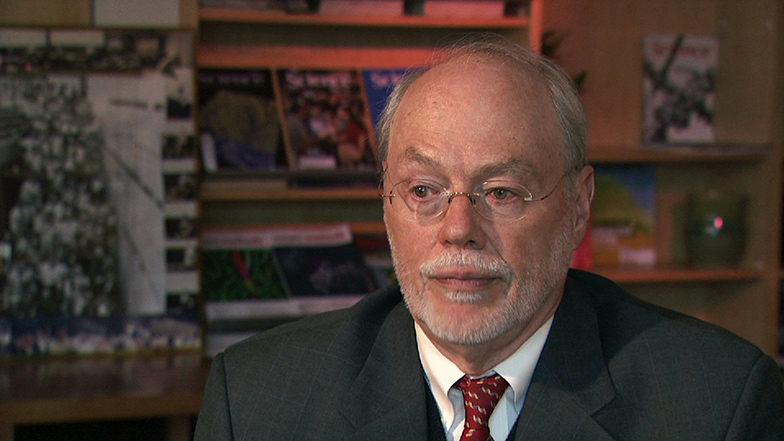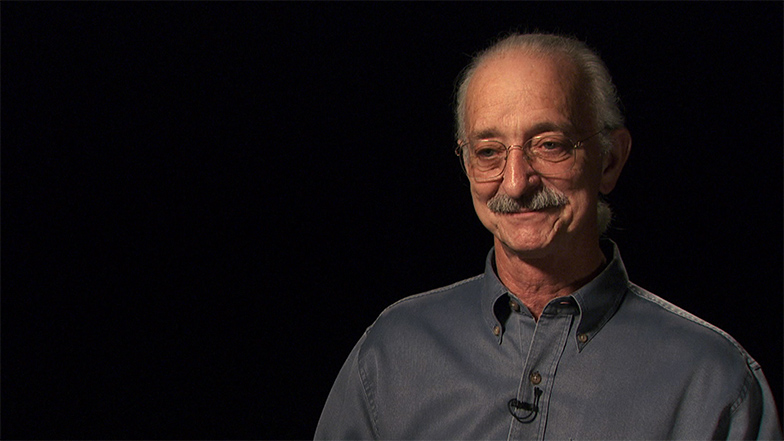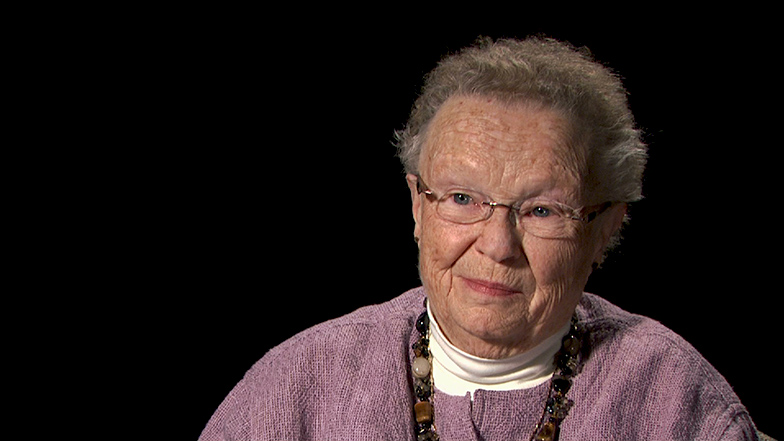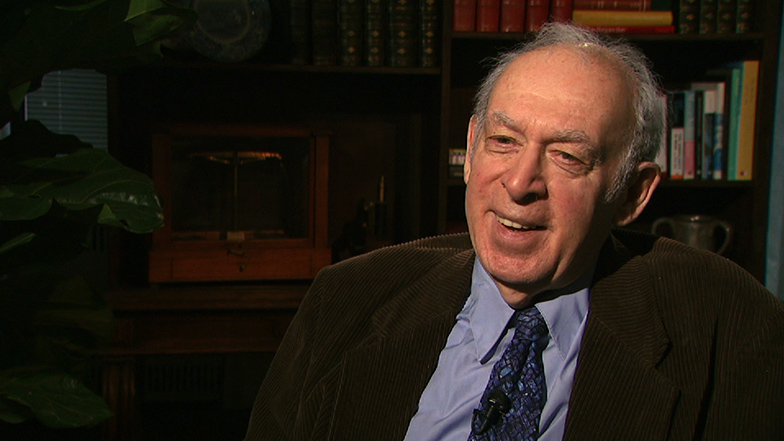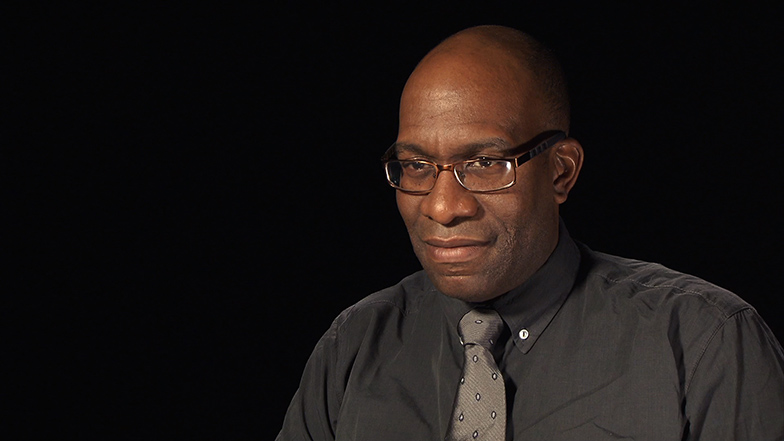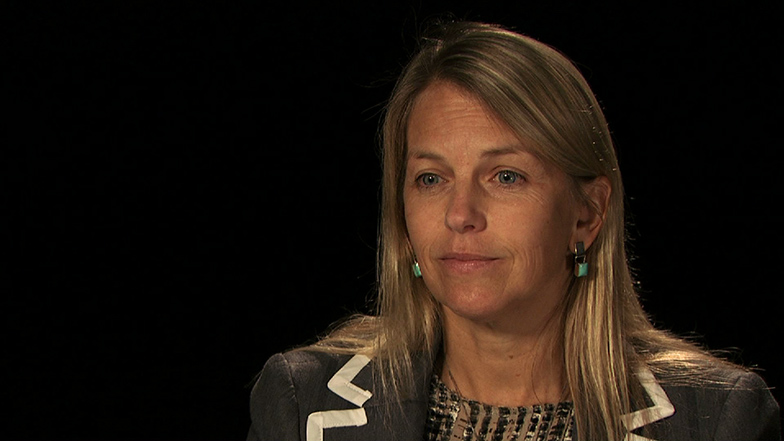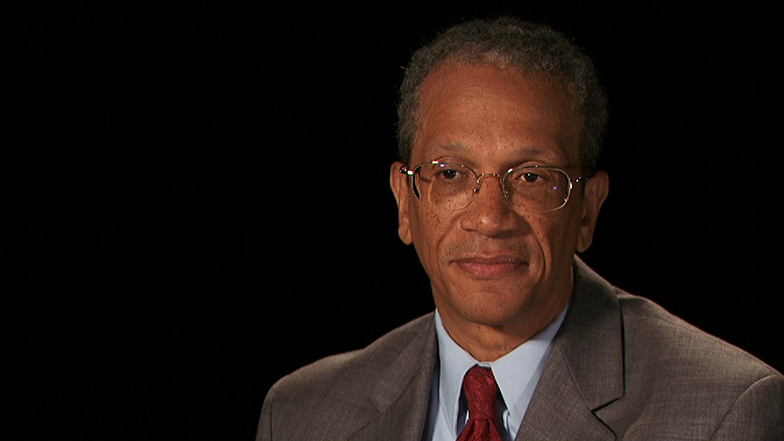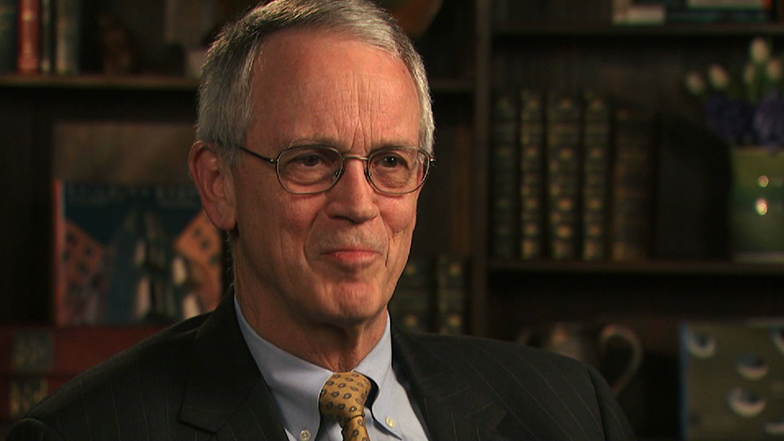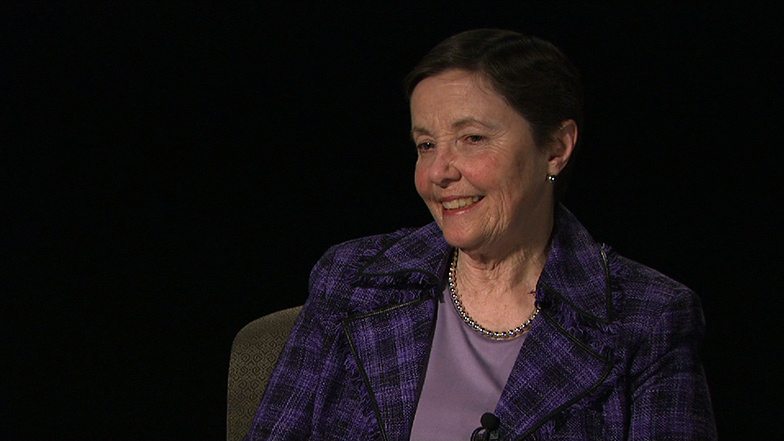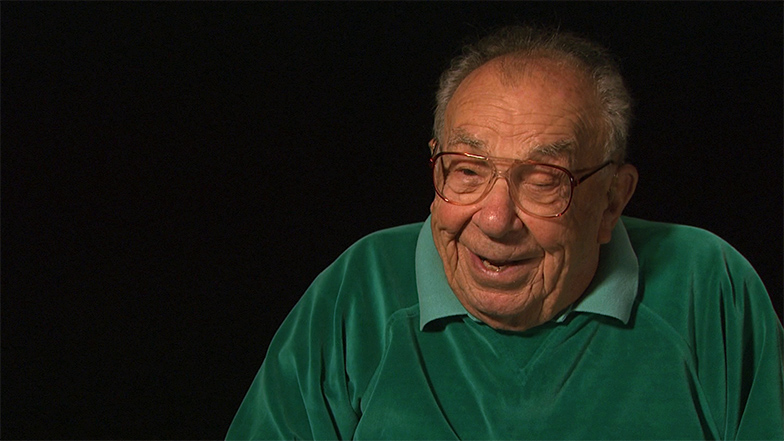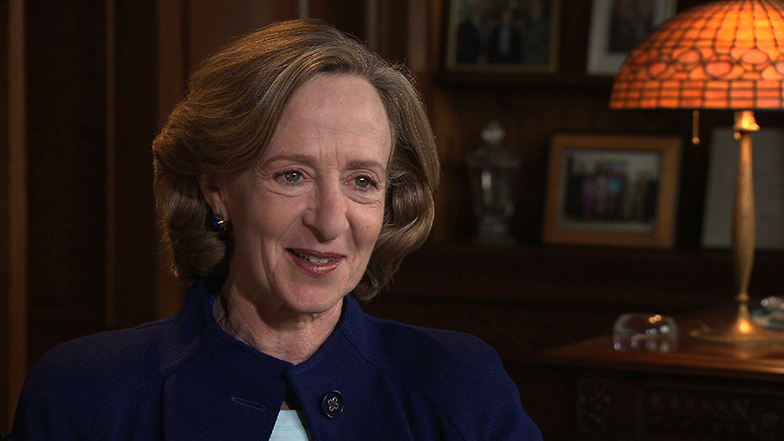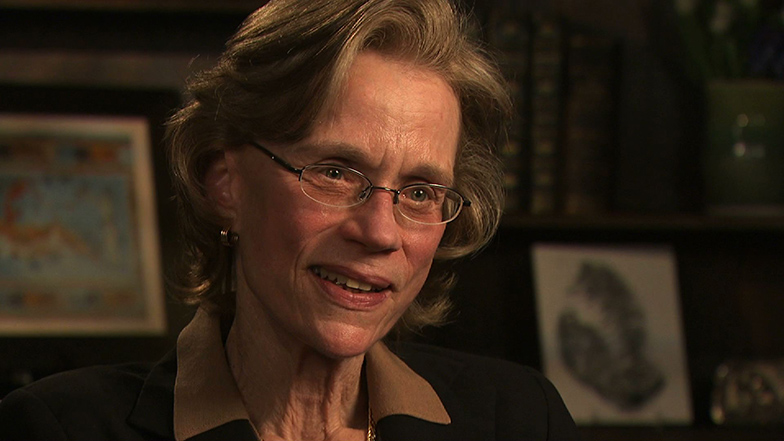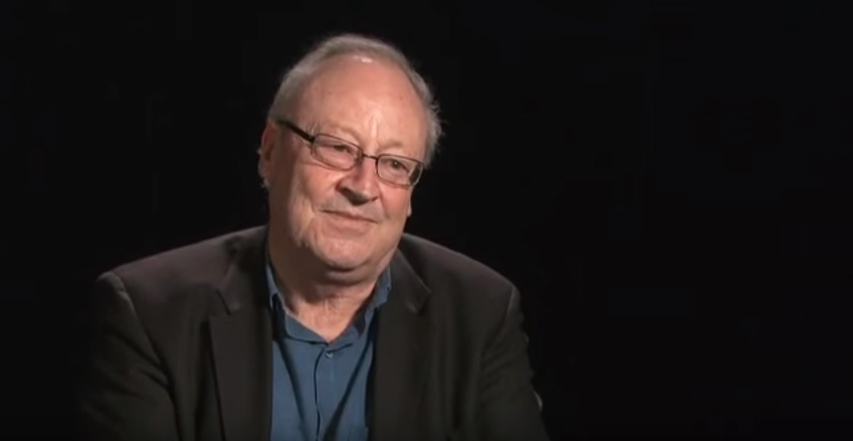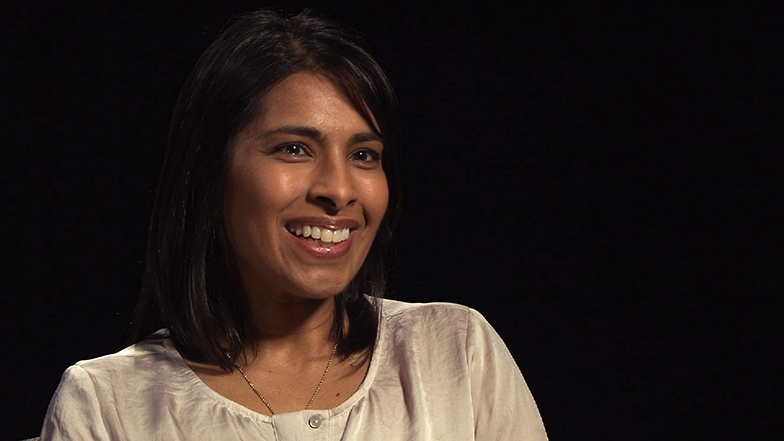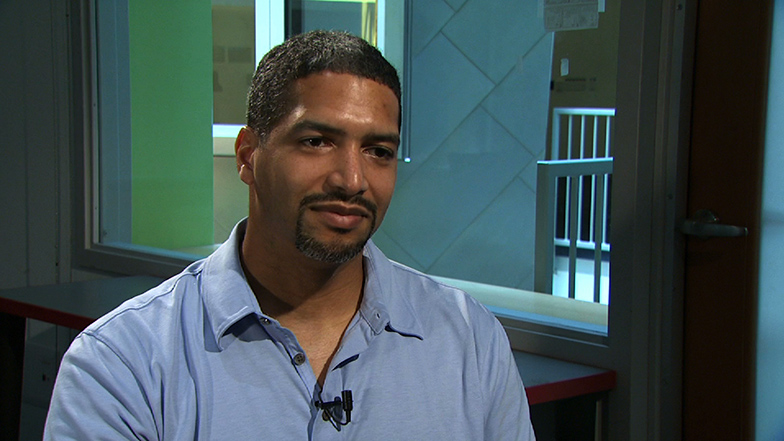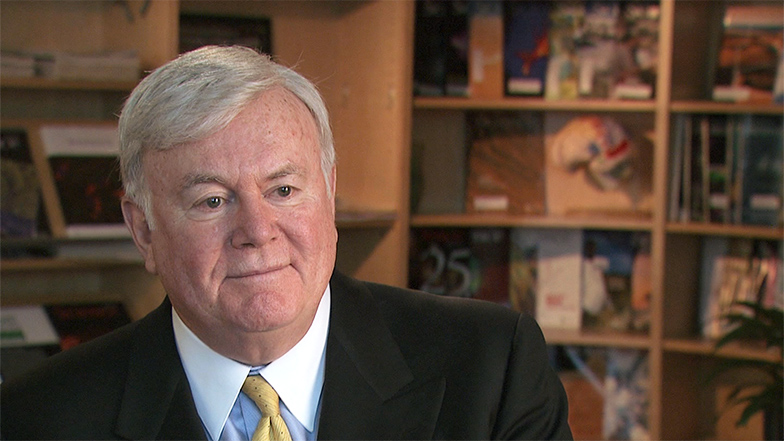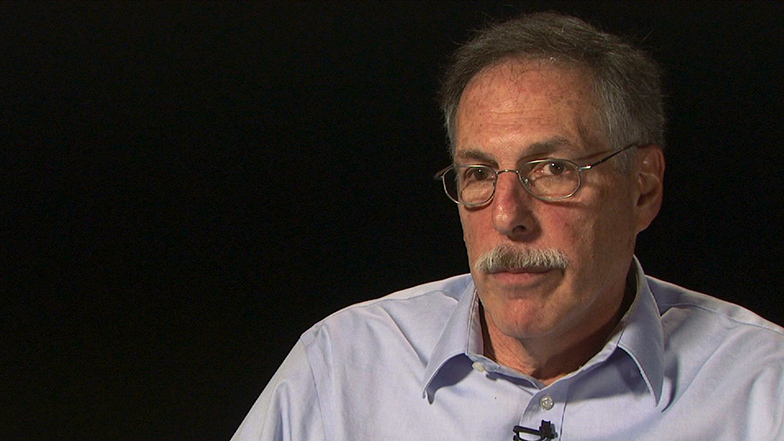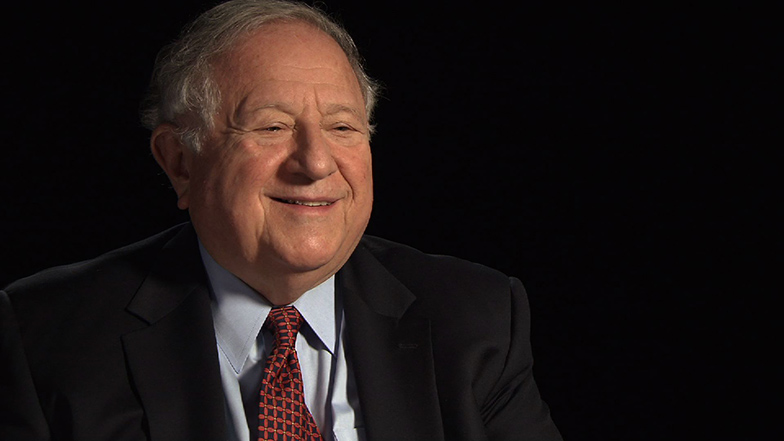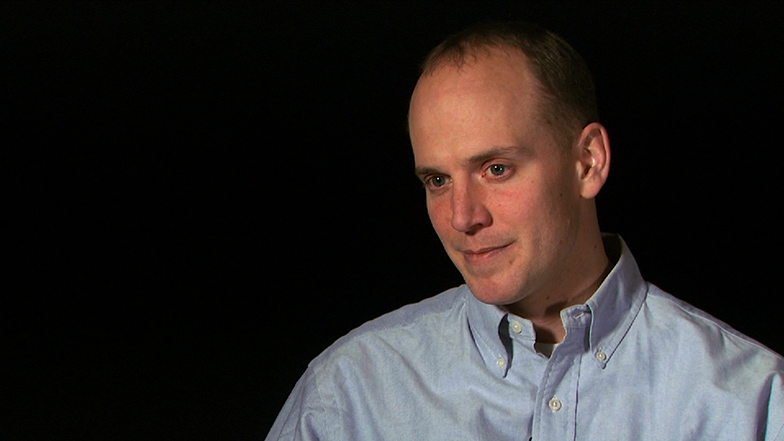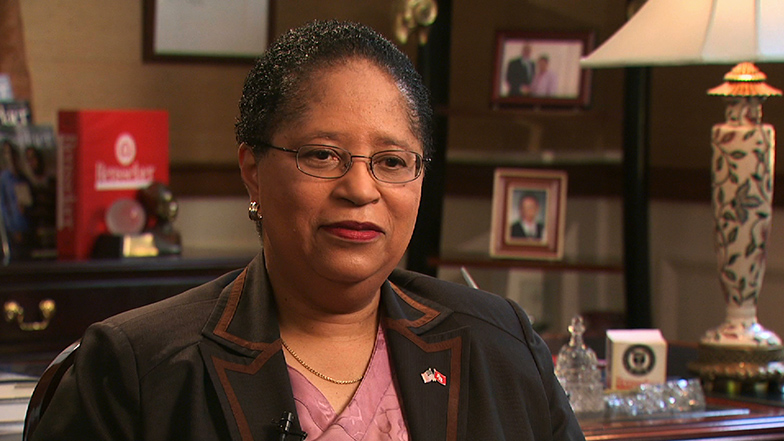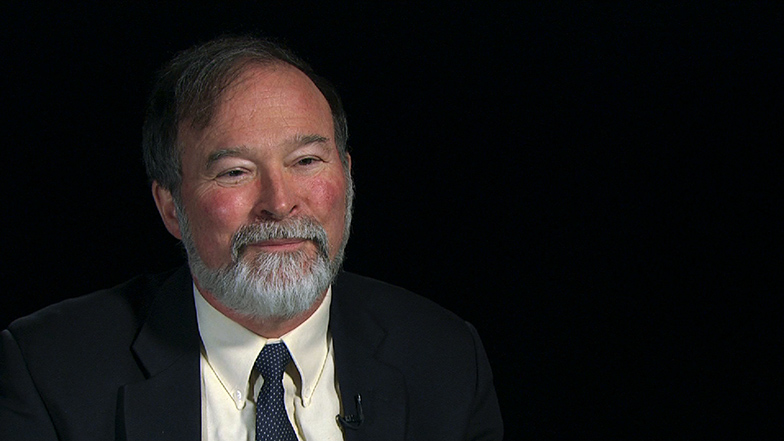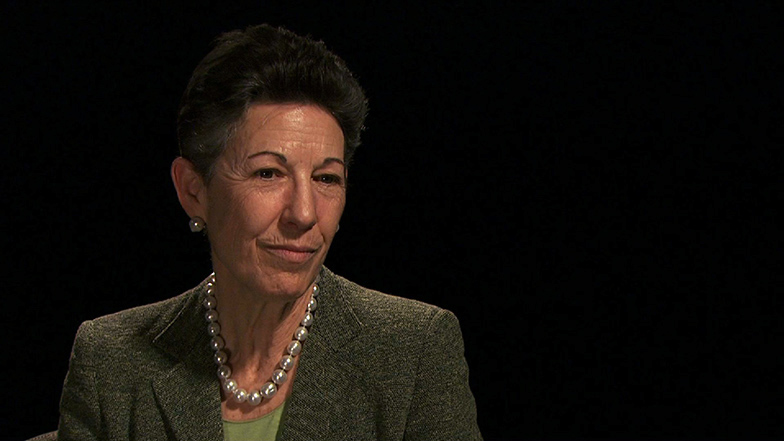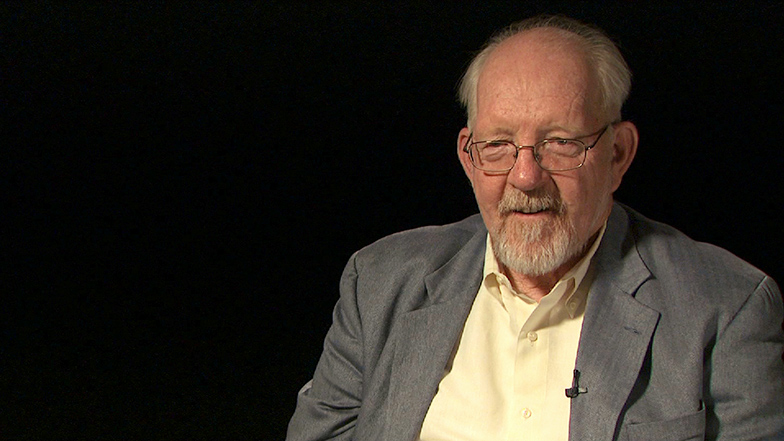Dana G. Mead PhD ’67
INTERVIEWER: Today is May 28th, 2009. I'm Karen Arenson, we're talking with Dana Mead, a West Point graduate who earned a PhD in political science at MIT and is now finishing his sixth year as chairman of the MIT Corporation. Thank you for talking with us today Dana. What do you do as chairman of the MIT Corporation?
MEAD: Well, I perform most of the traditional duties of a chairman of a board of trustees. I conduct the meetings, which we hold four times a year of the entire Corporation. At MIT we have a somewhat different organization in that we have 30 visiting committees. A visiting committee for nearly every department, lab, and center at MIT. And they're creatures of the Corporation, so they technically report to me. And I in turn, of course, report to the full Corporation. So I manage those. In fact, right now we're going through what we call our annual draft where we make the assignments to the visiting committees. It's a two-day process where we evaluate every Corporation member who sits on the visiting committees. There are five or six on every one. The presidential appointees, who are appointed at large, which bring the expertise in a particular area to these visiting committees and then five or six alumni nominations out of the Alumni Association. That's a big part of my job. I also chair some of the major committees of the Corporation. I chair the Membership Committee, which some would say has a lot of influence over what happens in the Corporation. But the Membership Committee also has responsibility to name and to nominate members to the Audit Committee, to the joint committees of the Corporation, to this Development Committee, and others as well as the Executive Committee. So although I don't chair the Exec. Committee, I sit on it and play a role. The Executive Committee is chaired by the president because it needs staffing and I have a very small staff and the president has a large staff, which can provide the kind of staff support that it needs.
I spend a lot of time in communication with members of the Corporation. Some of it is rather routine. Some of it is less than routine where a particular question will come up, a problem might arise, and the like. And then I spend a fair amount of time as-- for lack of a better term-- an adviser to the president. And we spend a couple hours a week together by ourselves and then discuss everything from things as mundane as the street scape across the street to curriculum reform to publicity concerning MIT to liabilities and things like that. I'm also, for lack of a better term, the shepherd of the bylaws of the Corporation. Bylaws of old institutions, you know, atrophy with time and I've spent a fair amount of my time in these six years picking through our bylaws and trying to bring us into the 21st century. Particularly in indemnification as well as in the way we conduct meetings and so forth. So it's a very full plate. It's advertised as not more than 50 percent of your time. In fact, it takes about 110 percent of your time.
INTERVIEWER: That's how many hours a week?
MEAD: It's a lot of hours. But it's a very rewarding and I think a very useful position. I know a lot of chairmen of other trustees. I've been on other boards and I think this particular chairmanship has-- first, it has broader responsibilities. Secondly, it has more authority in the process of MIT being successful.
INTERVIEWER: You've had an unusual succession of careers and leadership positions in very different sectors. The military, the corporate world, nonprofit arena, and even there I mean, West Point, the National Association of Manufacturers in the business roundtable, Royal Shakespeare Company, how is this different from most of those? I mean, running a university, this one in particular?
MEAD: You know, clearly it's different. It's hard in some ways. I'll give you a couple examples of how I see it being different. That litany of jobs, you left out one and that was I was also a tenured professor at West Point for a number of years. And I sat on the academic board at West Point and I often remind my colleagues around MIT that I'm used to arguing for years over five minutes of cadet time, which is very typical of an academic institution because student time is one of the really most valuable resources that you have. So I was not particularly surprised at what I found at MIT in the way that an academic institution makes decisions. But clearly-- and if you talk to anyone who's run a business who comes into this type of environment-- the first thing they say is it's excruciatingly slow. It's a highly quote, in quotes, democratic process in that everybody gets a cut at what is done.
It's an institution, and this is any academic institution in which the power is very diffused between the faculty, between the administration, between the oversight bodies. Whether they be-- in this case-- we call it a Corporation, but the trustees. And so that diffusion makes it difficult and slow to make decisions. On the other hand, it assures that when the decisions finally bubble up through the process that because everyone's had a cut at it; some are happy, some are unhappy, but no one can basically claim they haven't had a shot at it. So there's a broader sense of support. It's less top down than in a company. You know, in a company if the CEO speaks, whether it's intelligently or otherwise, it still gets done and the pieces are kind of picked up afterwards. So that's one thing. And of course, coming from a military background where you have very hierarchical set of authorities you know, if you wear Colonel's eagles the Captains will say, yes sir. And, how high? When you want them to jump because that's the way the military is structured. So those are different, but because I'd been in this academic environment most people believed that West Point is run pretty much as a military organization. It is in some regards, but the academic board at West Point is made up of all professors who are out of the Allied Army, who are tenured for life and have a relatively independent role to play in running their departments. The dean is similarly, the corps of professors and so the superintendent and the commandant who are the administration and come out of the Army are continually working with this academic board. Which represents the faculty and the departments, so it's not dramatically different than in a civilian institution.
INTERVIEWER: Let's talk about the path that brought you here and back way up to some biographical information. Where you were born? Where'd you grow up? What were you like as a child? And, were you a leader then?
MEAD: Well, I was born in Iowa. In a very remote corner of Iowa, the northeast corner. In a town of 3500 that's very famous in the state of Iowa for wrestlers. One of the biggest names is Dan Gable, an Iowa wrestling and Olympic champion and so forth. He wrestled in the same conference that the town I was born in, called Cresco, is in. My dad's cousin was the NCAA champion in '36 and '38 as a heavyweight. My dad roomed in college with the fellow that later coached the University of Iowa in wrestling. I grew up until I was in fifth or sixth grade with a couple of friends then soon to be national champions in wrestling as well a state champions. My family were owners of small newspapers and in the old days if you ran a county or a town newspaper you controlled the means of communication. And so most newspaper owners became politicians or became politically influential and so my family, my grandfather was a state senator from Cresco. And his secretary was a very smart, attractive young lady, who was first in her class at this small high school and so forth and my dad decided to marry her. And so that was my mother. And so she once work worked for my grandfather in Des Moines at the state capital.
At the end of the war we sold all the newspapers because it had been a rough time. My mother learned how to run the Linotype actually. She can do it Linotype. And moved to southern Illinois, where she worked for a publisher and my father worked for another company. And I went to high school in southern Illinois. I had a successful high school career. I was all state in three sports. I was president of the student body and you know, all the other good things. Captain of two teams and--
INTERVIEWER: So you were a leader then?
MEAD: --And other things. Yeah, I guess so. I ran for governor in Boys State and got beat in Illinois, but I came close. And on the football field I did well and I got a phone call one night from a young lady that lived across the street from me in the suburb where I lived and said, my boss saw you play football the other night. Would you be interested in going to West Point? And I said, well, yeah, I'd be interested. So one thing led to another and pretty soon I had Red Blaik on the telephone, which in those days was like having Bear Bryant calling a kid in Alabama or whatever. Because Blaik had just--
INTERVIEWER: So this was the football coach at West Point?
MEAD: Yeah, and had won a number of national championships. Coached Blanchard and Davis and so forth. And one thing led to another and I found myself in Fort Sheridan, Illinois, just north of Chicago, in March. In below-zero weather taking my West Point exams and my physical. And got admitted to West Point. I'd never seen the place, but I knew Blaik. Also Blaik flew to my high school, which was a big deal. One of the top coaches in the country flew into Wood River. And anyone that goes to West Point-- and of course I had no military connection in the family-- anybody who goes even if they've come from a military family of a long geological string of West Pointers-- the first day at West Point's quite a shock. You walk through that sally port and from then on your life has been transformed. Most people lie in bed the first night staring at the ceiling and say, what in the world am I doing here?
INTERVIEWER: Did you think about that before you went? In other words, that this would mean a military commitment and--
MEAD: Well, not really. Because I didn't come out of a military family. I was interested frankly, although I was the salutatorian of my class and the only reason I wasn't the valedictorian the chemistry professor got mad at me because he thought I was dogging it. So you know, and I had a lot of other opportunities. Harvard and Yale and other places. And I could have played football there, too. University of Illinois, University of Iowa. I was being recruited by a lot of places. I was interested in going to a place that had some discipline or more structure. And I found it.
INTERVIEWER: Why?
MEAD: I don't really know. I mean, I just felt--
INTERVIEWER: It just appealed to you?
MEAD: It just appealed. There's an old saw about West Point that I used to ask my classes when I taught at West Point, those of you that are getting married raise your hand. There'd be about half the class that raised their hand. I'd say, who is your wife marrying? You think she's marrying a cadet or a second lieutenant? And most of them would raise their hand and say a cadet. And I'd say yeah, unless they came from an Army family, it's going to be quite a shock when they find out they're marrying a second lieutenant who makes $222.30 a month when you graduate. And I think that's true of people when they enter West Point. They're entering to be quote, West Pointers. And the Army socializes those classes. And by the time you're in your junior year you're very committed to the Army. Or in my case, my class could still go in the Air Force, because the Air Force Academy hadn't had a class yet. And so most people don't think about it, and there are a lot of people like myself that went not really knowing what it was all about. I knew you got an engineering degree, which was fine.
INTERVIEWER: Everybody?
MEAD: When I went everybody got a general engineering degree. I had two electives in my class in my senior year. One of them was taught by a skinny, little, balding Air Force captain named Brent Scowcroft and he taught me Russian political history. The other was taught by a fellow who was a friend of Al Haig's, class of '47. Al Haig was one of my tactical officers. He was a major when I was a cadet.
INTERVIEWER: [INAUDIBLE] 1956, '57?
MEAD: This is '53, '54, '55. And I later worked for him a number of times, but he was a tactical officer of mine. And the other professor later became a four star general also and they were both in the social science department, which was also proselytizing cadets. Because what we did-- and this has a pertinent MIT connection for this week-- the social science department would identify cadets when they were in their junior year. And they would have your first steak dinner somewhere and say, if you get out in the Army and you do a good job would you be interested in going to graduate school and coming back here to teach? And we would pick off the Rhodes Scholars and the Truman's and the Marshall's or whatever. We didn't have the Truman's and the Marshall's then, but we had the Rhodes. And so we got very good people lined up and then we would contact them five years into the Army and say, you know, are you ready to go to graduate school? Some were, some weren't. Sometimes their branch that controlled their assignments wouldn't permit it. But we sent really terrific people to graduate school. And one of them is going to be here for graduation, Petraeus, who was recruited by the soc. department. Sent to the Woodrow Wilson School and came back to teach in the social science department. And Mike Meese, who's Ed Meese's son, is the head of that department now. And he's played a big role in Petraeus' strategy in Iraq and Afghanistan. So you know, there's a long history of this.
INTERVIEWER: Were you tapped like that too while you were in college?
MEAD: Yes, I was called in by the guy that ran the department. We called him Abe Lincoln, but he was General Lincoln who gave up a star after World War II to come back to run the department. These are all colonels. And he was Marshall's planner in World War II. He's a Rhodes, class of '29 West Point. Brilliant man, very country. Family were apple farmers in Michigan. And in my case, in my junior year I was called over to his house one night with a classmate of mine who also went to MIT with me here and was killed in Vietnam. He's a pilot. But we had dinner and they said, well you know, would you like to come back some time to teach? And I said, yes. And five years later I was at Fort Knox commanding a tank company and I got a call from a fellow named Bill Knowlton, who then was the executive officer of the department, which was really the prime job in the department. I was an executive officer when I went back the first time to teach and then went in. And my executive officer, when I was running the department was another fellow you've heard of, Barry McCaffrey, who was a major at the time. So they said, are you ready go to graduate school? I said, yeah I'm ready. What do you want me to do? They said, we're going to send you to Harvard. You're going to go to-- then it was Littauer before the Kennedy School had cranked in-- and we want you to go in January. And so I said, I'm ready. So send me the orders. And they called me back and said, you've been admitted to Littauer. You're all set. Lincoln could write a slip of paper out and send it to his buddies here, MIT, Harvard, Princeton, Yale, anywhere in the country and say, this is an Army officer I want to send to graduate school. Boom. Please admit him and we'd get admitted.
INTERVIEWER: Does it still happen that way?
MEAD: I can't vouch for that, but the reputation of the place is pretty strong. It probably is pretty close.
INTERVIEWER: So there you were slated to head to Harvard--
MEAD: So I'm headed to Harvard. And one of the great things that happened to me, my branch, the Armor branch said, wait a minute. You've only commanded a tank company for eight months or something. You have to command this company for over a year. And so I called and they said, well Harvard will not admit you midterm now. We found that out. So if you can't go in September you can't go at all. So I said, oh what am I going to do? So Lincoln said, I'm going to call my buddy, Lucian Pye at MIT. And he called Pye and said, I've got this captain and he's got good board scores. He can handle the work. Will you admit him? And Pye said, yeah. So I got a call back saying, would you want to go to MIT instead? I said, oh, sure. Sounds good. And they sent me a little propaganda. And this was right as the department-- department had been in existence, I don't know, three or four years--
INTERVIEWER: It had been part of the--
MEAD: It was still part of econ.
[INTERPOSING VOICES]
MEAD: Still Course 14. So I showed up here in January of '64. All they had was my name. And I walked into the department office and said, here I am. What's your name? I gave them my name. So I had to fill out everything. And of course, the military guys under that program if they can cut the work, are very welcome because they pay full ride. So they were happy to see me. And this other fellow, Harper Keeler who was a classmate of mine was already here. He'd been here for six months or one semester. And so we kind of worked our way. And after I was here a year and a half Bill Kaufman and Pye and Gene Skolnikoff, who's still here-- called me in and said, would you be interested in going for a doctorate?
INTERVIEWER: Oh, the original plan wasn't for a doctorate?
MEAD: No, no. These were all Master's degrees. And I said, well, you know, I'd have to get another year. So I called Lincoln and said, you know, I can stay for a doctorate. I'd like to do it. I'd like to take my generals this spring and then I can research the dissertation. And he said, I'll get you a year. He said, I need you back here to teach, but I'll get you a year. And he did get me a year. In exchange for that he said, but you're going to pay a little price for me. I said, what's that? He said, I want you to audit Samuelson's econ courses. And he was teaching at the time, Paul Samuelson was teaching his book, basically. And MIT in econ was teaching Samuelson. I knew my first year at West Point or first semester anyways I was going to have to teach econ to juniors. But I stayed a year. I got the generals passed. I researched my dissertation at Washington.
INTERVIEWER: Was that dictated too or were you free to choose a topic?
MEAD: Bill Kaufman and I chose it.
INTERVIEWER: Which was?
MEAD: The Army didn't even know what it was. It was on peacetime strategic planning. What I did, I analyzed the war plans between World War I and World War II. And of course, Kaufman, brilliant guy, you know, just died recently. He was the father of counterforce. He's the guy that really, when he was at RAND, convinced the Pentagon that there was a different strategy to be used in nuclear war and counterforce made a lot more sense than just kind of the huge just massive exchange.
So he had a method in his madness. What he wanted was for me to analyze how we made decisions in the face of uncertainty. We didn't know one, if we were going to have another war. Didn't know if we were going to have one, with whom it would be. We didn't know where it would be. We didn't know what the weapons would be. We didn't know what the technologies would be for communications, airplanes, and everything. And of course, there was a huge evolution between 1918 and 1941. My dissertation is about that thick. And I had a great little technique. I'd researched it all. Most of it in Washington at the World War II records division. You've done a lot of interviews, you'd be interested in this. I was working on what they call the Victory Program, which near the start of World War II the US got worried about-- we may end up having to fight Japanese and Americans. Japanese and Germans together. What would it take to fight a two front war? And they said, well, how are we going to figure this out? They said, well, there's this major walking around the hallways who went to the German General Staff College. The only one in the US Army who'd ever gone. So he understands mechanized warfare. Why don't we have him work up a plan? So he-- and I'll tell you why I know this-- he said, with a reporter's notebook he walked the halls of the then new Pentagon and asked anybody that knew anything about the war what it would take to do this and do that. And he came up with this huge plan. 11.5 million men under arms, 200 divisions 25,000 airplanes, you know, 100,000 aircraft engines. You know, on and on and on and on. Everybody thought he was crazy. The guy that ran the World War II records division said to me one day, this was in Alexandria in the old torpedo factories where they had them. In fact, they had all the German records too. They finally gave them back to the Germans 25 years after the war. But he said, aren't you working on the Victory Program? And I said, yeah. He said, well, the guy who wrote it, General Wedemeyer, is in the next cubicle. Why don't you go talk to him? So I spent a whole day, you know, talk about a primary source. And of course, Albert Wedemeyer was a major in '38 or '39 or '40. And he later became a four star general. He went to China, the Wedemeyer mission to China before Marshall and others.
But anyway, what happened to the Victory Program, it was leaked to the Chicago Tribune. And there's proof that Roosevelt was taking us into a two front war. It was leaked on the 5th of December, 1941. Congress went berserk, going to have hearings and going to do the whole thing. And then of course, on the 7th it all became moot.
INTERVIEWER: Interesting.
MEAD: But anyway, that's the kind of stuff we were working in. And so that was my trip to MIT. And the way I did it, every Friday night I would write a chapter. Nancy would type it on Saturday morning, and then I'd kind of go over it and then we would mail it to Bill Kaufman on Sunday. By the next Friday I would get back that chapter, annotated. If I had to rewrite it or do something I would start on that. She's typing the next chapter on Saturday and we just rolled this over for a semester and then I graduated the next summer.
INTERVIEWER: Was that the fastest PhD on record?
MEAD: Well, it was probably pretty fast.
INTERVIEWER: Wow.
MEAD: Over the years, I was close to MIT. In and out. I had a lot of people come down from the department to talk because from here I went back to West Point to teach for three years. And so I had a lot of people down there. Henry Kissinger used to come down from Harvard as assistant professor and sit there. Herman Kahn and I got to be good friends over the years. So I knew most of the intelligentsia. Brzezinski was down at Columbia by then. Bill Odom, who died not too long ago, who was head of NSA was in the department then.
INTERVIEWER: Do you think of yourself as a social scientist?
MEAD: Well, I'm kind of a quasi. I mean, I know how social scientists work and think, but I'm not a real professional in that regard. You know, the dissertation in some ways is history more than social science.
INTERVIEWER: Were you ever concerned that going off to do the graduate study and the teaching would take you off a track, a leadership track?
MEAD: Well, it's a great question because every officer who does this faces that. It's proven not to be a problem. But it's always held up as a problem. We always had a lot of problems getting officers released to go to graduate school. We would fight the Army pretty hard and even occasionally one of our alums would end up being the DCSPER, the person in charge of personnel at the Army, three star general, and even then we would have trouble. It was a tug of war a lot to get these people to go. But you know, for instance, here's Petraeus; it didn't seem to hurt his career. And of course, I'm really on the far side of this thing. I think there's nothing, nothing better for these army officers if they aspire to higher command than to have this intellectual grounding that they get by going to graduate school.
INTERVIEWER: But most of them do a Master's, not a doctorate like you do so it's a shorter--
MEAD: Right, most do a Master's. Most do a two year Master's. Some stay for PhDs. And you know, the Army has a whole set of schools, but they're professional schools, Command and General Staff College, The Army War College.
INTERVIEWER: So what was it like to be a faculty member at West Point?
MEAD: Well, it's great because these cadets are fantastic students. You have small classes in the soc. department, I think the largest classroom we ever had was 18 cadets. But it's hard work because you're teaching like four sections. So say you've got 70 kids and we were very rigorous. We made them write a lot of papers, we did a lot of exams. You can do a lot of other things. I coached football while I was there, I coached lightweight football. I ran the cadet ski program. You know, so you can get involved in a lot of other things there that were fun.
INTERVIEWER: Does your experience having both been a student at West Point and a tenured professor there color the way you think a college should be and that a university should run? Because that was so embedded as a model, how much does that affect?
MEAD: Well, it does in a way. It's a good question because well, I was there. I was there twice. I was there for three years then I went to Vietnam, came back, spent four years in the White House. Then I went back again. And I was an advocate of one concentration in other areas than just the pure general engineering. And also, concentrated engineering courses. You could get an electrical engineering education if you wanted to. You could get civil, you could get mechanical--
INTERVIEWER: You mean, at West Point?
MEAD: At West Point. Because when I went, I mean, I took it across the board. I could not have worked as an engineer in any one of the disciplines without a year or two of graduate school yet, probably. And also, you could concentrate in some of the social sciences. Predominantly history, political science, which would encompass international relations and economics and other things. So I fought very hard for that. But at the same time-- and here I like MIT for exactly this reason-- I also was very strongly in support of a broad distribution requirement in the first year.
INTERVIEWER: At West Point?
MEAD: At West Point. And in fact, when Bob Silby ran this recent curriculum evaluation here one of the places they looked at was West Point. Because basically all the plebes take almost the exact same courses. They have very little option in anything. They take massive amounts of math. They start on the sciences, they take some physics just like we do here. They took languages also, were required. So you know, gave everybody a grounding and then they could begin to branch out. Now when I was there you didn't branch out till your senior year. Everybody in my class took the same courses their sophomore year and their junior year and only in the senior year did we get any kind of electives.
INTERVIEWER: So MIT is a little bit unusual in having such a strong set of core requirements, but it sounds like in that sense it's similar to West Point.
MEAD: Yeah, and I think they accomplish the same thing. You know, I'd say that the West Point distribution requirement is somewhat more rigorous than MIT because we fold in the language in the first two years at West Point, we don't do that here. But they're very similar and they accomplish the same thing.
INTERVIEWER: Which is?
MEAD: A lot of the cohesion in these classes is because everybody took 802. I don't have to tell you, you know, and so yeah, the pain has been shared throughout the organization, in that regard. Now West Point has other ways of cohesion. You live in the same living group your whole four years. You get to know everybody in your quote, it's a military company and the like. But you know, years ago I was asked, I complained so much about leadership here at MIT that finally Chuck Vest said, well, why don't you come here and do something about it? So I came and I taught for six months. I had two letters, one from the dean of Sloan and one from the dean of engineering, which basically were my credentials. Which meant I could go and do anything I wanted or talk to anybody I wanted. And at the end I wrote a paper about what I saw were the differences in leadership development here and some things we ought to do. Most of which we're doing now by the way.
INTERVIEWER: Which are?
MEAD: Well, the one thing I pointed out was that almost everyone we recruit here is a leader, has been a leader in either one or a number of regards. Some have been student government leaders, some have been leaders academically, some have been in civic, you know, we just looked at some applications the other night together and you see what kind of students we get, and we do the same thing here at MIT that West Point does. They get all these leaders too and they grind them down to kind of dust to use an expression. There's a lot of humility involved. There's all the kinds of things you go through. And these are young people. And at West Point however, after they do this they have three years of very carefully designed, time-tested ways to begin to rebuild you as a leader in their own image. And they've been at it for over 200 years, so they're getting halfway good at it.
At MIT we didn't have those kinds of programs. You had to kind of fend for yourself and wind your way through the process and maybe find a mentor or find something that interested you where you could be a leader or you could begin to exercise your notions of leadership or what needed to be done. And I said, what we need to do is start thinking in terms of providing more leadership opportunities, even for a freshman, for our sophomores and then really start taking it very seriously for our juniors and seniors. And a lot of the programs that we've put in, including some the academic programs, particularly at Sloan are the result of that. And every now and then someone will call me and say, You still have a copy of that thing you wrote? And I'll say, I can't even find it. I don't know where it is. But the other day Tom McNaty called me, said, I want to see that. I said, Tom, I don't even know where it is. I can't find it. And he called me back, said, I found it.
INTERVIEWER: He's now digitized it and put it the--
MEAD: I don't know what he's done with it, but I hope not. So you know, there were a lot of parallels.
INTERVIEWER: Do you think the grinding down first is necessary or useful or is there a way of avoiding that? Or wouldn't you avoid it even if you could?
MEAD: No, I think there's a way to avoid it. I do think there's some things that happen during that, that are good. I think some ways of inculcating humility and kind of a better sense of how you fit in, I think those are positive in a way. Because you know, you're walking a very fine line, you've got to be very careful because people are young, they're impressionable and I think also cohesion is a good thing. Living with the same living group, doing things like that, I think are--
INTERVIEWER: Which most MIT students do.
MEAD: Right. Exactly. So I think that's all positive. You know, I remember-- you'll get a kick out of this-- Hop Keeler and I used to on Thursdays walk down here in the Infinite Corridor and go down where they were posting the answers to the problem sets. And we'd sit on the steps and we'd watch the agony that would take place. It was kind of entertainment, you know?
INTERVIEWER: This was when you were a student?
MEAD: Yeah.
INTERVIEWER: It doesn't happen now?
MEAD: No, you don't see it anymore.
INTERVIEWER: I don't think it happened when I was an undergraduate.
MEAD: You don't see it anymore. But it was exquisite agony to watch people do it.
INTERVIEWER: Do you think to the extent that you focus more on inculcating leadership or emphasizing that, do you think there's a trade-off between that and the technical expertise? That there's any kind of zero-sum game. In other words, is there a risk that the more you focus on developing leaders that you lose a little bit of the strength that MIT's traditionally had?
MEAD: Well again, I encountered this. I had actually some professors say to me, hey, lay off the leadership stuff. I'll teach them differential calculus.
INTERVIEWER: When you were here?
MEAD: Yeah. When I came back. I'll teach them differential calculus they can learn leadership when they get out of here. And I would say, too late. What I wanted to see more, particularly in the technical side, I wanted to have kind of a consciousness about leadership. I'm an MIT graduate. I've been given one of the finest technical educations in the world. I'm going into a society where understanding of science and technology is going to be critical to the success of the country and the society. I have a responsibility to be a leader of some sort and I wanted to raise kind of the consciousness level about leadership in the student body. I didn't want to compete with being a great research scientist, and I didn't feel it had to be a zero-sum game. For instance, I talked to number of professors and say, hey, you're a role model. I'm not a role model. No, I'm a [INAUDIBLE] the blackboard. I'd say, no, no. You are. People look at you and they see themselves in 15 or 20 years and you have that responsibility. And I said, It doesn't hurt to kind of talk or kind of exhibit leadership of some sort to these young students. Some of them agreed with me, so you know, you got a point. And this whole mentoring thing is very much part of that.
INTERVIEWER: Mentoring of?
MEAD: Of students and of junior faculty.
INTERVIEWER: And of junior faculty?
MEAD: That's the other thing. There's a leadership responsibility there, also. Most of the really top senior faculty understand that and do it. But you know, in the visiting committees one of the kind of central themes throughout visiting committee discussions is that we're not really good at mentoring. MIT is not good at mentoring. And it comes out in two-thirds of the visiting committees. And the department heads will agree and say, I'm working on it. We're trying to get people committed to it. So my first complaints in leadership were at Sloan because I was recruiting and hiring Sloan people when I ran Tenneco and also at IP. And I would say, these people have great, great technical educations. They're smart and focused, but I said, most of them can't lead me out that door. It's not because they can't. They're not interested.
INTERVIEWER: How could you tell?
MEAD: Interviews and I mean, after we hired them. And I used to tell students when I was here, look, if you're sitting in a paper mill in Androscoggin, Maine and you're a chemical engineer, MIT graduate and you're surrounded by a lot of engineers from a lot of great schools, when you're sitting around this table discussing it all the heads eventually are going to turn to you. You know why? Because you're the MIT graduate in the room. You've got a certain responsibility to uphold as a leader in that regard. And they'd kind of go oh, you know? I had one student who was a student leader here who was a terrific young man. He said, well, leadership isn't important because we all work in teams. I'd say, have you ever done a project in a team? Well not yet but... I said, well after you do I want you to come back and tell me if you thought leadership wasn't important and what it was. Five years later he was wandering around the hallway here and he grabbed me, he said, you know, you remember when we had breakfast? I said, yeah. You're right. That's all he said. You were right. I've had that interest in this.
INTERVIEWER: And once you catch their attention, how do you facilitate or foster? How much is it you know, it has to be in you, you're born that way and how much can you teach?
MEAD: Well, I used to use this as an example-- my numbers may not be right, but-- I said, Look, I know the West Point classes very well. In any West Point class 10 percent of that class are what you and I, under the current vernacular would call our natural born leaders. Nothing you do to them or for them is going to change that. You can go through a terrible experience in college or whatever and at some point they're going to be leaders. Another 10 to 15 percent of every class are never going to be leaders. They may be individual contributors, may be technologists or whatever, but they're not interested in people. You know, they're just not. The great middle, maybe 60 to 70 percent all have some leadership capability. It may be very latent and it doesn't come out till later. There's where you have to concentrate and you have to do it in different ways. You have to use experiential, give them experiences in leadership. That's what West Point does a lot of. It doesn't hurt to be intellectually cognizant of what leadership is. It doesn't hurt to talk about what values are important to leadership. Whether it be integrity or whatever. To include professional skill and talent, capability. And you can develop that group. And who knows what will pop out of that, you know? My class at West Point had a number of four star generals. It had a number of corporate CEOs. It had a chief of staff of the Army.
And I would say that if you took that group and you kind of put them in those different categories I went through half of those people would have been in that top 10 percent. The other half would have been in that other group. And they developed and they got opportunities and did it. And you know, you read the history of West Point. It's one I'm more familiar with, but you know, you can read about the class of '15, which is Eisenhower and Bradley and Van Fleet and those guys. You know, maybe two of those three would have been in that kind of top 10 percent, but maybe not. You know, George Patton would be in that top 10 percent and he was a terrible cadet. You know, he was turned back one year academically. And MIT's come a long way I think in this regard.
You know, the graduate students run the Leadership Conference every year where they bring in people from outside. You know, a lot of the programs we have now, I used to say another thing you can do is bring leaders in so people can see them and listen to them and see how they think and what they've done and why they make decisions the way they've made.
INTERVIEWER: Interesting. Do you think that having been a tenured professor has given you any greater understanding of faculty issues or made you any more or less sympathetic to faculty concerns?
MEAD: Well, I'll take it backwards. Yes, I think it's made me more sensitive to faculty concerns. I'm quite sympathetic with the faculty, frankly, because I think the faculty is where the rubber hits the road. I mean, that's where you have most of the contact with the students. That's where most of your academic expertise resides. It's where a lot of your reputation resides. It's where your ability to recruit the succeeding generations of excellence resides. So I'm quite sympathetic. When we did the presidential search I was insistent that we had one, a large faculty advisory committee, which was as representative as we could make it. And secondly, that it be directly involved with the search at every level of the search. Because I thought one, the faculty views and the faculty support of whomever we chose was going to be critical. And the faculty brought a lot to the process for us. So I've been pretty supportive. You know, there are all these things about faculty, and it doesn't have to be faculty, in a large industrial organization it's the same thing. There are all these things that you're not going to particularly support that they want to do or things you want to do they're not going to support. But that's part of running an organization.
INTERVIEWER: Why did you leave teaching?
MEAD: Well, that's a good question. When I went back to West Point from the White House I was going to-- one, I was going to do some writing. I'd been involved in a lot of interesting things in Washington and I was going to do some more teaching. The job itself is a highly administrative job. You sit in meetings constantly, remember I said--
INTERVIEWER: This was as a dean--
MEAD: Well, I wasn't a dean, I was a head of a department.
INTERVIEWER: Head of a department.
MEAD: I actually went back as a deputy head of a department. And then my head was gone for a year, year and a half, so I headed the department. And then, this third year I was there-- well, the start of the third year-- the superintendent whom I'd known as also when I was a cadet he was an instructor of mine in the soc. department. Very incestuous group. Called me in and said, I think there's something wrong with the honor system and would you and another colonel named Harry Buckley-- who just recently died, who's a few years ahead of me at West Point. Maybe class of '53 or '52-- He said, I want you and Colonel Buckley to put together a group study group. And you can have cadets, you can have junior officers, you can have anybody you want and I want you to study the honor system for me. And you've got carte blanche, you can do anything. You can quiz cadets, you can go through the honor committee-- which is a group that's elected by each company that supervise it-- and find out and see if anything's wrong. Well, we did that. At the end of a year I went into the superintendent and I had a bunch of print outs under my arm and other things. And I said, We've got a problem. And the problem was with what they call the toleration clause, no doubt. The cadet honor system is, a cadet they do not lie, cheat, or steal nor tolerate those who do. And the only sanction for toleration, in other words, if I knew you committed an honor violation and didn't report it, I tolerated it and someone found out about this and I went to the honor committee and they basically tried me the only sanction would be dismissal. And in that day and age things had changed so much that there were very few cadets who were actually willing to see someone dismissed because of toleration. So the place was kind of crumbling.
This guy was a lieutenant general. Very outstanding officer, fantastic combat and management leadership record. He was working hard for his fourth star. And he said, look, I'm leaving in June. So why don't we wait till the new superintendent comes in and we'll work on this. About two weeks later the head of the electrical engineering department came into my office in Thayer Hall, closed the door, sat down and said, we have a problem. They'd given a take-home exam in electrical engineering and 140 exams came back of the 600 or 700 hundred cadets who took it. And they all had a unique solution to a problem on the zener diode. And one cadet had done what you're instructed to do if you receive help on something. You asterisk it and down at the bottom you put a footnote, I received help on this from cadet Arenson on blah, blah, blah date. And you're not guilty of an honor violation, but you don't get credit for the answer. And only one had done it and he had done it on this unique solution. So they started thumbing through these writs and they found 140 that had this unique solution. So that was the genesis of the famous honor scandal of 1977, '76. I ended up being the guy who wrote all of the letters for the superintendent to the alumni. I wrote all the testimony before the Senate and the House. I coached the cadets that had to testify to this thing. I basically ran the process for about two years. And I didn't get in a classroom for two years, although I never felt it.
You know, something just kind of soured me. I was the West Point representative on the Borman Report and, you know, they got Frank Borman and they put together a group to come up there and do it. And you know, we were on the cover of Time Magazine. Guy from the New York Times decided to make it a crusade to bring the academy down. Tom Downey was a young congressman on Long Island who decided to try to do the same thing. And so you know, we had a pretty interesting fight on our hands. They sent Andy Goodpaster up to be the superintendent. He'd retired as a four star, they took away his star, they put him back up there. Andy and I went back forever. We were appointed from the same district in southern Illinois. Abe Lincoln was his mentor also. I used to write exams for the National Work College and send them down to him to use. So we were very close. But I went in and told him that I was thinking of retiring, and he said, well, he wasn't real happy. But he said, you know, I don't think I'm surprised. He said, I think you got too much horse power for what we have you doing. And my wife thought I was crazy. You know, we had a big home on the river up there. I was chairman of the athletic board, so I was hiring and firing coaches. I was still the offensive coordinator for the lightweight football team, which was great. Interestingly enough, the fellow who I knew from my White House days that hired me at International Paper was another name you've heard a lot of, Paul O'Neill.
And Paul and I were on each different sides of every issue in the White House. He was the director of OMB that handled the programs that I as an associate director of the domestic council handled. So the same programs. But we got to be great friends in the process because we were butting heads constantly. And so that's how I ended up at IP.
INTERVIEWER: In other words, you started to put out calls and he said, hey--
MEAD: Yeah, well I let it be known I was looking around. I was very particular. Refused to go to Washington because all my White House experience wasn't perishable then. I got a lot of offers to be chief lobbyist for large corporations and things, but I said I wouldn't do it. So I only interviewed in Boston, New York and San Francisco. So we ended up in New York.
INTERVIEWER: IP was--
MEAD: Headquartered in New York, yeah. Working with Mr. O'Neill. So that's how I left the Army.
INTERVIEWER: How did you reengage with MIT?
MEAD: Paul Gray got in touch with me somewhere along the line when I was still with IP. You know, we used to have a committee on committees, which was basically a committee that looked at the membership on the various standing committees and other committees.
[INTERPOSING VOICES]
MEAD: Yeah, it's now done by a combination of Susan as president and myself as a chair and with inputs from other provosts and the Executive Committee. But then we had an actual formal committee. And I was recruited to go on it. Mainly because--
INTERVIEWER: Before you were on the Corporation?
MEAD: Yeah.
INTERVIEWER: Interesting.
MEAD: And then I went on the Corporation. I was on it for some time.
INTERVIEWER: From '96 on I believe?
MEAD: Probably. Yeah. And on the Political Science Visiting Committee I think.
INTERVIEWER: Before that?
MEAD: Yeah. And you know, I'd been at IP quite awhile, because I left the Army in '78.
INTERVIEWER: And then headed to Texas after that.
MEAD: Well, yeah. I was recruited to go to Tenneco to Texas.
INTERVIEWER: So you were actually at Tenneco by the time you came on to the Corporation?
MEAD: No. I left IP in-- oh, yeah. That's right. No, no. You're right.
INTERVIEWER: '92. And then '96 you came on.
MEAD: Yeah, for some reason I was thinking it was--
INTERVIEWER: It all blends together--
MEAD: Yeah, it all gets together.
INTERVIEWER: How did you get tapped to be chairman? And were you surprised?
MEAD: Well, I can't remember who called me. I think maybe Chuck Vest did and said, would you have any interest? And I said, well, I'd be interested in talking to you. But I really was a little bit surprised. And they said, well would you be willing to come up and meet with the search committee? And I said, yeah I will. But you know, you got to remember it's going to be kind of a two-way conversation because I don't know exactly what you're really looking for and I don't really know a lot about what the job entails. And they said, oh, don't worry about it, you know? Come out. So I came up and I met with the committee. We had a quiet, kind of interesting conversation. And basically I think they were more interested in plumbing whether or not I had any interest. And when I left they called me and I said, well, I'll be willing to talk about it. So then I came up and then we got into more specifics. You know, what would you think you would do? Do you have any ideas? And so forth. And you know, you have to be pretty guarded. Well, you don't know enough about it to make a really intelligent--
INTERVIEWER: So you'd been on the Corporation six or seven years by then, but it wasn't one of your biggest activities I suspect.
MEAD: No. Well, I was still running a big company, you know?
INTERVIEWER: You had stepped down as chairman and CEO of Tenneco in '97, right?
MEAD: No, '99. Nine.
INTERVIEWER: '99, Okay.
MEAD: End of '99.
INTERVIEWER: But now we're two or three years beyond that, but you were still doing a piece of it, case or--
MEAD: Well, I was still doing the chair of the auto parts business and also the packaging business.
INTERVIEWER: But chair, not CEO?
MEAD: Right. Exactly. But I had a lot going on, you know, but the timing was good from my standpoint, and you know, our families, our kids are-- we had our children when we were very young, so they're all been gone. So we didn't have any geographical limitations for time, so it worked out. And I think Jim Champy called me and said, you know, we'd like to nominate you if you'd be interested. So I said, okay. Nancy and I talked it over before I said okay. And I got elected. And of course, we were living in Greenwich. And I got a call from Chuck Vest that said, are you going to be around New York in the next couple weeks? And I said, yeah. He said, well I'm going to be down there at something, why don't we have lunch at the university club? And so I thought, well, this is just a friendly lunch. Chuck and I, we were pretty good friends and he said, now before you really take this job I want to tell you something. I said, what is it? He said, "I'm going to retire. And he said, you know what that means? I said, yeah, I know what that means. But I said, well you know I've made the commitment. This wouldn't scare me off anyway. It's a great opportunity actually. And I was more concerned about Chuck's future and also how long he would intend to stay because I knew we were going to have to have some overlap. But right then you know, everything kicked in and I started thinking seriously about how we'd go about it. So I did a lot of research or I looked at all of the previous files that we had on search committees. At the time you recall that BU is going through a terrible period trying to find a successor. And they got Dan Golden and then a day later dismissed him. You know, it was a terrible mess, but I kept a big file of everything that they did or didn't do, and kept it so that when we put our committee together I said, here. I passed it around and said, here, I want everybody look at this. This is not how we're going to do it. One, we're going to do it properly. We're going to do it quickly. And we're going to make the right decision. And the MIT search committees had had some ins and outs because even Chuck's selection was different than might be normally, you'd imagine.
INTERVIEWER: The Corporation had approved Phil Sharp and he accepted and then the next day he decided it really was not the right thing--
MEAD: Changed his mind. Exactly.
INTERVIEWER: --the committee had to go into second and--
MEAD: Luckily, they had talked to Chuck--
INTERVIEWER: And got Chuck Vest.
MEAD: --and that was great. You know, I knew that was going to be job number one and of course it was, because although we asked Chuck not to announce I believe until December, we were already working on it pretty hard. I wanted to be able to announce to the members of the Corporation search committee, the faculty advisory committee and basically get our process moving within weeks after he announced.
INTERVIEWER: Which was in December? But you knew between March or so when you said yes and July when you took office? Sometime in that period you found out.
MEAD: I knew that.
INTERVIEWER: So you had a little gearing up time and then planning time?
MEAD: Right. So by January we were ready to go. And looking back on it, we did it in nine months, and that includes all the vetting, all the reference checking, very extensive interview process. So that was number one. I knew it was going to be on the list. I also knew that we were going to have to do something with the financial structure of the place. You know, we had an organization which was very pragmatic and almost dysfunctional, in that we did not have a chief financial officer, so we didn't have all of the traditional functions that reside in a chief financial officer in one place.
INTERVIEWER: We didn't have someone of that name or of that function?
MEAD: We had neither the name nor the functions.
INTERVIEWER: You had someone who was both treasurer and effectively CFO?
MEAD: No, we had someone who was the treasurer and the chief investment officer, Allen Bufferd. Who did a tremendous job. I mean, it didn't have much to do with the individual. And we had John Curry who's the executive vice president for administration, who had some of the other financial functions, but not the treasury functions nor the investment functions. And the decisions that are made between the two traditionally would fall under a CFO, but because we didn't have a CFO they were kind of distributed, if you will. The most glaring one was every year out of the endowment we make a distribution to the general Institute budget. You probably already know this Karen, but it's complicated in that you have units in pool A of the endowment, and you get so much distribution per unit, and there's pool C also, which sits in there. But basically it's the decision of how much money is going to go from the endowment into the budget. That was being made basically by the same person who was running the endowment and not by the person that was running the Institute's budget. Or even in conjunction with the person running the budget. So just from a management standpoint we needed to do something and Allen, to his great credit, had already developed a proposal for a standalone investment management company, where all of the investment function would be concentrated. And at the same time we would pull out the treasury functions from that and transport them over to what was then the executive vice president's job. And so we would marry up the controller functions, the audit functions, and the treasury functions, and basically create a CFO type job. There are a lot of reasons we didn't have one. They're not--
INTERVIEWER: You're combining the CFO with the chief operating officer?
MEAD: No. With the chief administrative officer.
INTERVIEWER: Chief administrative. There isn't a COO? I mean, there's a provost and a chancellor and a president.
MEAD: Yeah, you've got it. The COO's job is also split up here because you know, Rafael is provost that runs the academic side of it.
INTERVIEWER: I've never thought of that as a COO. I think of that as an academic who carried a lot of budget responsibility.
MEAD: Right, exactly. A huge amount of budget responsibility.
INTERVIEWER: Which now has also been taken out because there's a CFO?
MEAD: No. He works with Terry, whose title doesn't say CFO either, but she has all of the financial functions under her. And we've just finished taking out all those treasury functions, for instance, the debt. Who manages the debt? That was over in the other side.
INTERVIEWER: As long as you had no one it didn't matter, right?
MEAD: Right, exactly. Now we got it. I think in the first few Corporation meetings I presented the investment management company for approval to the Corporation and they approved it. There were a couple of things that are interesting about it. One is it did place a lot more focus and, frankly, a lot more oversight in management of the endowment in that company, investment management company because we had a separate board for it. But also, it enabled us, the way the old bylaws were written the old investment management committee had to be composed entirely of Corporation members. The investment management company board has four or five slots. We've left kind of flexible frankly, for outsiders.
INTERVIEWER: Out of--
MEAD: Non-Corporation members.
INTERVIEWER: --four or five?
MEAD: Out of about 13.
INTERVIEWER: 13.
MEAD: Out of 13.
INTERVIEWER: So there'll be a minority, but can be a sizable minority?
MEAD: Yeah, of the commitments I made to the Corporation was that we would always maintain control of that board, we the Corporation. And so there are eight term members of the Corporation that are on that board, and right now, we have five outside members who also are appointed for terms. And it's enabled us to tailor that board in ways that we could never really do before although we got some, as you know, some of the top investors in the world on our Corporation. And some of the really smart financial managers on the Corporation, but this enabled us to bring in people that for instance, one graduate-- you probably know her-- Leslie Rahl, is an expert on derivatives. Big time. And we brought her on initially to help us kind of work our way through the thicket on derivatives. We have Helmut Weymar who is also a graduate, you know, who's one of the top commodities traders in the world or has been. So we've been able to tailor it. We have Cathy Minehan on there who ran the Boston Fed for a long time.
INTERVIEWER: So is this fairly parallel, say, to PRINCO and Princeton or to Yale or Harvard?
MEAD: It's closest to Stanford.
INTERVIEWER: The others tend to hold it inside more like we used to?
MEAD: I think so. I know that we liberally cribbed Stanford on this, who'd gone through the same thing about a year before we did. We did look at a lot of schools. It's been a while now, my memory is a little hazy. We looked at a lot of people on organization and how they did it. But then not only did we have to put a board together, which was relatively easy, but we had to find someone to run the thing, the so called president. And we ran a search and we settled on Seth Alexander, which has turned out to be a genius stroke.
INTERVIEWER: Who came out of Yale under Swensen--
MEAD: Who came out of Yale under Swensen, of course, and you know, had worked for David Swenson for 10 years. I think he's provided a lot of good leadership for someone as young as he is. Because if you look at the first line of the directors in that organization that worked for Allen and they were all very outstanding people, none of them has left. They've all stayed. And we don't pay our people there or, well, forget Harvard and their problem, but we pay them okay, but nothing exorbitant for the performance they've had.
INTERVIEWER: And how's it working now?
MEAD: It's working.
INTERVIEWER: Or is it the time to say, here we are in this crisis and everybody's portfolio is going down--
MEAD: I'm reluctant to give you a number. You'll see it soon enough, but I think that we're not being hit as hard as some of the others. Now that's not to say that we haven't had a rough time, because we have, but I think we're going to prove to be less than down 30 percent during this free-fall.
INTERVIEWER: From top to bottom?
MEAD: From top to bottom. Probably we'll be somewhere between around 8 billion from 10--
INTERVIEWER: Because?
MEAD: --which is 25. Well, mainly because first, you know, we had a decent exposure to equities which have been blown away. Everyone uses the Swenson Model, so there's a lot of alternative investment there. So you've got a lot of private equity, you've got a lot of venture capital. And when the first tech bubble burst we got hit much harder than others by virtue of the fact that we put so much money into our graduates' ventures and things. And we still do, but we haven't been hit as hard there because it hasn't all been concentrated in tech. It's been everywhere else. But Seth early on started to bring us out of the mortgage business, so we saved probably $600 million of losses there.
INTERVIEWER: In other words, MIT had been in it more and pulled back earlier?
MEAD: Right, pulled back earlier. The other thing, we run our own real estate operation. And it's done quite well. Now, real estate's getting hit also, and we're beginning to capitalize more on the value of this real estate that surrounds us. You know, we have 200 plus acres out here that we're not using, but what we've done is we've tried to protect the strategic value of that acreage. We basically have been selling buildings on it, but keeping the land. Which others have done too, but it's helped us.
INTERVIEWER: That's a kind of British--
MEAD: Yeah, very. Your 99 year lease, right? We're doing okay. You know, you never know, but I think when the year end is put to bed here we may be in reasonably good shape.
INTERVIEWER: So you came in as chairman with some real top priorities, with an agenda saying, this needs updating, this needs updating. You've mentioned a couple of them, were there other things on that initial agenda?
MEAD: Yes. One was I've always believed that the visiting committee structure that we have is a unique and extremely valuable way to perform oversight. And to really get into the organization in a way that you're not intruding, that you're not causing problems, but you're supporting and you're getting developing knowledge of what's really going on. I've made a habit-- I did it with Chuck and I did it with Susan-- of trying to convince them of just how valuable it is, and I think they were all convinced. I think Susan had never seen it before. So it took a round for her to really realize how valuable it was, although sometimes it's a little bit grating because you hear some things in some of these committees that you don't want to hear. You want to hear them differently. And I think Rafael I know feels that way. But I wanted to do a couple things with visiting committees. One was by that time, by the time I was chairman I'd been on the ESD Visiting Committee, I'd been on political--
INTERVIEWER: ESD?
MEAD: Engineering Systems Division. Nuclear engineering, I chaired it.
INTERVIEWER: I did that one for awhile.
MEAD: Okay, and of course political science.
INTERVIEWER: I did that one, too.
MEAD: Yeah, so I'd seen what I would call good visiting committees, average visiting committees--
INTERVIEWER: So you think there are variations?
MEAD: Huge variations. And a lot of it is a function of leadership of the chairman and even the Corporation members on there and the department head. And in some cases, the dean. And I wanted to first, upgrade the performance of the chairman of these committees and to share what the good ones did and to try to see if we couldn't just elevate the basic performance of the committees. And I instituted early on what we called boot camp. We've tried to come up with a different name, we haven't been able to do it. But once a year, for all of the committee chairman-- and usually I'd say, two-thirds of them attend-- we have a three to four hour session after a Corporation meeting in the afternoon where I basically get up and I talk about best practices, areas of emphasis, the whole bag.
INTERVIEWER: What kinds of things?
MEAD: Everything from report preparation to meeting conduct to areas of emphasis if you know, drive on diversity. But the other thing I do is we try to give them a base of information so they can assess what the departments are telling them and what the deans are telling them in a broader context.
So for instance, the early boot camps, we had Claude come in, Canizares and talk about space. Here's the space problem from the standpoint of the Corporation because you're going to hear it from your department.
INTERVIEWER: You don't mean outer space, you mean space at the Institute?
MEAD: Yeah, right. You're going to hear they need more space. They can't teach. That labs are too tight, blah, blah, blah.
INTERVIEWER: More money for grad students.
MEAD: Yeah, right. And here's the situation. We also always gave them at each boot camp a very detailed financial presentation. This is where our money comes from, this is what we're spending it on, here's how much is going into student aid, how much into graduate student aid, undergraduate, here's how much--
INTERVIEWER: Institute wide or department by department?
MEAD: Institute wide. I'll get to the department in a minute. And here's the capital structure, here's our debt structure, so that they had a lot more so they can respond to what they were hearing from the departments and from the faculty and from the students. And it worked beautifully and we still do this. The other thing we did, we got the people that do all of the data for MIT to do a deck. And you've probably seen it, on each department. It goes to the visiting committees.
INTERVIEWER: I've never seen that.
MEAD: Which gives you every minuscule number about this department. Everything from simple stuff like here's the age of everyone of the tenured faculty or the age of the assistant faculty. Here are the numbers of tenure track and so forth. Here's how much money they spend. Here's their square footage. Here's how many dollars per square foot we're spending on this department. Here's how many students they have. Here's their degree experience. Here's their tenure record and so forth. So we have this now on every department and we give this to the visiting committees so they can thumb through it, and it also has all the diversity information. And so we elevated it that way.
The other thing we've done is we've asked the visiting committee chairs to evaluate the performance of their committees. And every year, as you know, two or three people in each category, alumni, presidential, and Corporation end up with their terms expiring. Corporations only happen because you're going off the Corporation for one reason or another. And we first ask for recommendations and reasons for either appointing or not reappointing those people. The second thing is we ask them for nominations. Now we also ask for nominations from everybody under the sun as you know. But we brought the chairman in as really a working chair to evaluate what was going on. We also instituted the interim report. You know, there was always a criticism and a very good one. Hey, we come in. We work very intensely for a day and a half. We learn a lot about the department. We get excited. We want something to happen. We go away and we don't hear for two years. So we initiated an interim report, which is prepared by the chairman in conjunction with the department head and the dean, which basically says, this is what's happened since the last time you were here. You remember you recommended that we give language classes to some of the TA's who no one could understand? Because they're from somewhere else. And we've done that or whatever. So it was an interim report. That interim report also goes to the Corporation and to the Executive Committee. So in the process we've kind of-- and I think you know, you don't want to be too self-satisfied, but we're much happier now with what's going on in the visiting committees from the standpoint of the report being much more valuable. They're talking about more important things. It's got more balance to it. The requirement has always been that the chair of the VC provide an oral report, 10 minute oral report to the Corporation. Well, we used to do it without the written report being in the hands of the Corporation. Now we require that the written report be done, be staffed, which they do get staffed, and be in the hands of the Corporation before the chair makes the oral report. And you know, it's changed the whole context in the value of these oral reports.
Because people can ask intelligent questions. They know what they're talking about. So we've done that. I also put an executive session at the back of every report to the administration, 10 minutes to give the committee a chance without the department head there--
INTERVIEWER: I think that had always been there. No?
MEAD: If it had it wasn't when I got here. And it took us a couple years to put it in. I'd tell you, you know, it's funny how things--
INTERVIEWER: Without the department head or--
MEAD: Without. It's funny how things--
INTERVIEWER: But with the dean?
MEAD: Yeah, we keep the dean.
INTERVIEWER: So it's the dean, the president and the chairman?
MEAD: Yeah. The reason we instituted it when we did-- and I'd been thinking about it anyway-- but we got into a situation where the committee wanted to fire the department head. And the only way I could figure out we could talk about it was have an executive session and then I didn't want to signal to the rest of the place that this one department had to have an executive session, so we put it in for all of them and it's worked out really well. They don't really get into things that you might suspect. They don't talk about what a dirt-bag the department head is or anything.
INTERVIEWER: Well they aren't, right?
MEAD: They basically come up with things that are worth talking about and it's been successful. But anyway, that was another thing on my agenda on getting that process set. And I think it's worked out all right.
INTERVIEWER: It sounds like the process and the way you've changed it there's a logic to it, if you go to the next order, I mean, do you think departments are truly being run better now as a result? I mean, it's always hard, you put the system in place and then you can sort of say--
MEAD: Well, I would say the oversight of the departments is better. Now if that results in better run departments, you know it's hard to tell.
INTERVIEWER: I guess you have to look at your indicators later to see whether there was some help moving closer to what you want.
MEAD: Which is another real value of these indicators. You've now got a dynamic you can use and take a look at it. And one of course, that I've been harping on is diversity. And every visiting committee has instructions, you must discuss diversity, and if you don't you're not doing your job. And most of them do now, but when we had the report to the administration, if they haven't mentioned it I always bring it up and most have. That's one. Now of course, cost management is becoming a area of emphasis. But you know, I think generally the process is working all right. I tell the faculty this all the time, I'm always asked, how do I get involved in governance around here? And I tell them, I say, you know, one way is to be very active when the visiting committee is here. If you get invited in to talk to the visiting committee, go! Because a lot of times a visiting committee would say, we'd like to talk to the senior faculty. Three of them would show up or something.
INTERVIEWER: In other words, they were all invited, but not all of them came. It wasn't that they were selected?
MEAD: No, no, no. And the same with junior faculty. And I tell students this too. Same with students. Here you got an unparalleled opportunity. You got people that are interested in what you're going to say and you have an opportunity to talk to them at the highest level. I went and talked to the undergraduate group the other night.
KAREN ARENSON: CJAC or student government?
MEAD: No, UA government. They asked me, how do we get our views out to the Corporation? And I ask how many of them had ever been invited to a visiting committee breakfast or lunch or just a talk? And most of them with the exception of the freshman in there had been invited. And I said, how many of you went? Well, you know, a sprinkling, but these are people that are pretty aware of what's going on. And I said, you missed a great opportunity if you didn't go. And Barun Singh who's one of the junior or either recent graduates, members of the Corporation, he was there. I'd invited all of the recent members to go with me to this session. He was the only one in town so he went. He stood up and made a great, great speech about hey, I've been on a visiting committee now. Now I understand. We do pay attention to what the students say. We do pay attention to the faculty. And I said, right there. I can't answer the question any better than he. I've been telling the faculty and the other thing we've done is for the visiting committees we've said the dinner is not optional. It's an integral part of the visiting committee's agenda and the faculty are invited. And so that way they sit with the visiting committee and the faculty's spread out and you get to know the faculty and if they've got a bone to pick they'll tell you about it.
INTERVIEWER: I thought that was a built-in part.
MEAD: Before I'd say only half of the visiting committees used to invite large numbers of faculty. They were pretty selective.
INTERVIEWER: Costs money?
MEAD: Well it does cost money, but it comes out of the Corporation. Comes out of the Corporation office.
INTERVIEWER: Do you think that you've got about the right number and kind of visiting committees? It is a lot. Are there any you think you don't really need or are there areas you can think of that aren't covered?
MEAD: We've gone through a little bit of change when we lost a department, ocean engineering. So that was folded into mechanical or, no, ME, I guess it was.
KAREN ARENSON: EPS, or?
MEAD: No, ME. I think.
INTERVIEWER: Mechanical?
MEAD: Yeah, I believe. But we're right now creating new committees. Humanities, which covered the waterfront. You know, it was impossible to cover all the activities that were folded in under humanities. So we're creating two new committees. Social sciences, which would encompass history and not the other social sciences, political science and econ, which already have their own.
INTERVIEWER: Their own departments.
MEAD: Right. And then humanities. And so we're breaking those up. We're going to take the existing visiting committee and scatter it out a little bit. But we'll have two new chairs. And you know, we created biological engineering when it became a full-fledged department. So we've kind of followed the route. Then another thing I had on my mind and having Susan come on board was very helpful, I wanted the Corporation to begin to reflect a little more what the Institute looked like. For instance, women was one area. Here we were admitting classes with 40, 45 percent women and the Corporation had on the term membership group and the life membership group about 8 or 9 percent. That was about it. And now we're up to 23, 25, 28 percent so we're getting up there. Also, from the standpoint of expertise and experience for instance, in your profession journalists, TV types, yeah I know. I mean, we've been thin there. We've had too many financial types around, for good or ill.
INTERVIEWER: Deep pockets.
MEAD: Yeah, they have deep pockets and they're smart people. They've done things. We've not hadn't many CEOs and nobody has. I mean, nobody can get CEOs on their boards or anything. Because they're too busy and their boards are getting very picky about it. They don't want them out there exposed or using their time. So many of them won't have their own airplanes there'd be even fewer.
INTERVIEWER: To get the local ones.
MEAD: Wasn't too hard for me to jump on my Gulf Stream to come up here to a Corporation meeting, but if I were fighting on US Air or something back and forth it'd be a little harder. But I think we're slowly accomplishing that. We're adding a large foreign component to the Corporation. This time you know, we're electing three from outside. We just put Tony Tan on from Singapore. We've got a Spaniard coming on, a Saudi coming on. So we're going to gradually probably add another one or two in the next few years as we go a little more international. So I think we feel pretty good about that. You know, we always have a problem of attendance.
Well, we get good attendance. I mean, for an organization that has a little less than 70 members and has also about 18 or 19 emeriti we get 75 percent, which is pretty good. But we have one or two who are prominent people that we have a little trouble getting here. And the international people, just so you know, I have a deal with them. They have to make two Corporation meetings a year. October and March. Those are the big business meetings. I like them to make the others and they have to make their visiting committees. So they don't have to come from southeast Asia or Taiwan or wherever to make the December meeting, which is a pretty full meeting, but it's not as critical. Or of course, the one next week, which is you know, an hour and a half. Very, very fast.
INTERVIEWER: Colleges and universities started out much smaller if you go back a couple hundred years, and heavily faculty-dominated, I think. They've grown larger. A lot more money involved. I think many of them have adopted more of what we call well, management-- better, different management practices. At the same time there have been complaints that somehow colleges and universities are becoming too corporate. That somehow this takes them farther from their roots and that you lose something, that maybe you've gained something, but that there is this trade-off. Do you think about that? And if so, has the spectrum changed or the place on the spectrum changed and what does one do about it or is that okay?
MEAD: First, I don't worry about it too much. But I think you know, there is something to be said. I'm kind of I guess almost instrumental on this point. Education has gotten a lot more expensive. And it's not because people are profligate or bad managers, necessarily. But it's just more expensive equipment. In a research institute like this you know, labs are much more expensive, equipment is much more expensive, even the staffing has gotten more expensive because they're dealing with different kinds of things and I would say that a lot of the criticism in this regard comes from-- you talked about it kind of managerial-- but it's a way to try to at least manage these costs. And I think that sometimes intrudes upon what a researcher or professor or a teacher might feel is their territory or their perview. I'll give you really a simple example.
When I first got here, a friend of mine, a CEO of a very large company that makes laboratory equipment called me and said, I know how you buy lab equipment at MIT. And you guys have the worst purchasing system in the world. He said, It's all decentralized. So you know, Professor Arenson can buy her beakers, her test tubes, her Bunsen burner and everything on her own, and right next door Professor Mead is buying the same stuff. But he's buying it on his own. Maybe from a different vendor. And you ought up consolidate a lot of this stuff. So I had somebody look at it and I talked to him again, also. And I said, what if you did this? What if we bought all the common gear a in a consolidated way? And we got a discount on that. You know, Bunsen burners x is the same in 80 labs around here and then we let the professors buy the specialized equipment from whomever they would buy? And would that meet? And the answer was yes. This guy's company didn't want to bid on either one of them. He was just kind of giving me his view. And in fact, that's what we've done. And we've saved a lot of money on the common stuff. And the professors, if they want something very special for their own, they go out and do it. You know, we did that in Tenneco with shared services, and paint was one of the things.
When we started looking at paint among all these companies, 10 companies, we were buying paint from everybody all over the world. You know, an aircraft carrier takes a lot of paint. And we figured out that a lot of this paint was what you and I would call a commodity. We could buy it from anybody. And yet, when there was some special paint that had to be bought we did same thing. We said, all the simple stuff, all the commodity stuff we're buying together and you've got to have special paint on this particular part of the nuclear reactor of a submarine, you can buy that. But everything else, the gray paint you're going to slop all over that aircraft carrier, we're buying. So there's a lot of that goes on. And you know, we won't go through this right now. It's going to be amazing what we're going to see. You know, we have these task forces that are working on reducing costs. And I'm very interested, I've told Rafael, don't be shocked at what you see. You may be pleasantly surprised. You may not be. But it's going to be very interesting to see what people come up with. People normally will not arrange their own execution. They'll come up with maybe ways of saving money that we haven't thought of, which'll be good.
INTERVIEWER: You've been active with the Royal Shakespeare Company and were president for a time of the American arm of it, wing of it, well, how did you get involved with that and what was it like? But then also, what role do you think the arts should play at MIT? Do you envision any changes? Is there enough or too much or different?
MEAD: Well, I got involved accidentally. I'm not a big Shakespeare addict. But a friend of mine, a head hunter, very famous head hunter was asked to find someone to build a board for the Royal Shakespeare Company of America and he said, oh I've got a friend of mine. Does this kind of stuff all the time. He likes this, and so forth. And so one thing led to another and I ended up-- and I created the RSC America Board. And because I'd done that I was invited onto the London board, which is the board. And it was fascinating. Now I'd spent 12 years on a European board, Zurich Financial Services as the only American. So I had a lot of experience on kind of a different board, but the RSC was even better. Very interesting, Stanley Wells, who's one of the great experts on Shakespeare in the world used to sit next to me at meetings. And I would pick his brain about whatever the recent Shakespeare blow up was. And we had Lord Bob Alexander as the chair of the English board. Judi Dench was on it, Jeremy Irons, and Prince Charles is the patron of it. So we used to go to High Grove once a year for a big blow out and everything. It was very interesting. What fascinated me about RSC really was the creative process.
I loved to watch how they did it. You've got to remember, they're putting plays on that have been probably produced, what? 50,000 times? And they do it differently each time. And they're very creative. I thought that what MIT does would fit hand in glove-- and I was involved with Shakespeare before I came back here as chairman-- but would go hand in glove with RSC. So the first thing I did was to try to put together a program here to digitize the archives of the RSC. And in the archives of the RSC for instance, they have every script that's ever been produced by the RSC with all of the marginalia of the director, of the lighting, of the scenery people, the costume people, and everything, and it can all be reduced to digital. And also, they'll have, if you're doing Hamlet as a director and you want to see how Sir Gilligan did it. How Laurence Olivier did it you can call it up and watch. So a guy named Peter McDonald here in Literature--
INTERVIEWER: Peter Donaldson?
MEAD: Donaldson, yeah.
INTERVIEWER: I was going to ask you if you knew him.
MEAD: Yeah.
INTERVIEWER: Isn't he wonderful?
MEAD: Yeah, he's the guy that started it.
INTERVIEWER: Yes, in the 80's.
MEAD: He's still going at it right now, but the University of Warwickshire got onto this and said, why are you letting MIT do this? And so they took a bite out of it. So it's a little bit.
INTERVIEWER: But he had done a lot already in terms of taking all the movies that existed that he was allowed to and then making them searchable so you could search for like three characters, with a woman and two men or two men--
MEAD: Exactly. Yeah. And we were doing all of the documentation, everything. Next to Janet Sonnenberg. You know, she was already working on the use of dreams and things. And I got her involved with the artistic director of the RSC and for the last two years she spent summers over there working with them on it. Then we got Henry Jenkins interested in a Shakespeare game. And we were doing the Tempest. It went a long way down the road. I don't know what's happened to it.
INTERVIEWER: Like Guitar Hero?
MEAD: Yeah, you could actually manipulate the outcome of the Tempest using Shakespeare's work.
INTERVIEWER: What if the ship never capsized?
MEAD: Right. But you know, so it had commercial applications. Then we started to look at, what is the big cost in producing a Shakespeare play? It's rehearsals. And the problem with all of these really top actors is getting them all together for rehearsals. You've got to capture Judi Dench and Raif Fiennes and you've got all these other people wandering around. We actually designed a prototype of a virtual floor. So they could project you on this floor into Stratford and I could be talking to you, but you actually were standing on a platform at the Media Lab at MIT, and I was standing on one at RSC. So we had a lot going on on Shakespeare. And we were funding some of it, too. We, the RSC America. You know, how things do, they kind of wax and wane. And I brought RSC in here because I wanted to do a residency at MIT. Lee Bolinger, when he chaired Michigan, I had him on the RSC America board. In fact, I was with him at lunch the day he got the call from the search committee at Harvard telling him that he wasn't going to get the job. But he had one in his back pocket. He knew Columbia was there and he knew Mike Sovereign very well.
INTERVIEWER: In his other pocket he had Shakespeare.
MEAD: Right, and he had Shakespeare. Well he brought him in you know for three weeks. They spent 17 weeks rehearsing before they got there. They did like 90 classes. It was unbelievable. They did the histories three or four times in two-day increments. You went to three of the histories on one day and you went to the fourth one on the second day. And it was really a tour de force. And I wanted them to do the same thing here. I didn't want it to get up the river because they would have captured it, but they looked and we didn't have a venue. They didn't feel they had venue here. Which gets me the second part of this answer.
I think the arts are critical around here. I think they're very, very important. You know how the admissions numbers look. I think the number is 70 percent of our admitted classes have some experience or proficiency in the arts whether it's music or drama or whatever. And it's a fantastic outlet for this place. And it adds a dimension to people. We don't have venues. Shirley Jackson at RPI just opened this incredible arts center. In fact, The Times had it on the front page of the Arts one weekend. Anywhere you go, I was just at Indiana University-- ever been out there?
INTERVIEWER: No, I've been to Indiana.
MEAD: If you ever get a chance, go to Bloomington. It's all in Indiana limestone. It's gorgeous. They have an arts center that is incredible. And you know, they're famous for their music and their arts programs, but we would kill to have a facility like that.
INTERVIEWER: Where you going to put it?
MEAD: Right up Mass Avenue.
INTERVIEWER: You're looking for the donor now?
MEAD: We'd love to find a donor.
INTERVIEWER: What do you think it would cost?
MEAD: Well, you know, there's a lot of debate about-- we're looking at one. There's a small, small plan, which would be rehearsal rooms and a black box theater, a small one. And they're talking $25 to $35 million. I think that that would be basically not a good use of that resource. If we had $35 million we got to raise $150, $200 million and build a real performing arts center with a couple theaters in it, rehearsal rooms, recital type rooms.
INTERVIEWER: What would make it different from Kresge's? In other words, what about Kresge didn't work for RSC?
MEAD: Well first it doesn't have the acoustics. The big problem with RSC is one I'm familiar with, is that even at Stratford, you know, they've gutted the old theater now and they're rebuilding it. It only had 15 feet behind that back curtain. So you couldn't even run sets in and out or the sets had to be off the stage area.
INTERVIEWER: Stratford?
MEAD: At Stratford, yeah. Shakespeare wants a thrust stage, not a proscenium arch. They want a thrust. That's easy to build. I mean, but you gotta build it. Kresge doesn't have it.
INTERVIEWER: Removable seats and so forth--
MEAD: There are a lot of things about Kresge. By the way, we also got in the lighting with RSC. We were going to try to do automated lighting and stuff, so if you raised a hand and said, the thunder is there, the minute that hand hit a laser signal up there the thunder would come and same with lights. But we need a performing arts center here.
INTERVIEWER: You think it will be doable in the next five or ten years? Even in this economic climate?
MEAD: Yeah.
INTERVIEWER: We're just going to get better, right?
MEAD: It's going to get better, right. No I think it's a possibility. You know, we've got to get W1 over here finished because that's going to enable us to bring another 400 undergraduates in.
INTERVIEWER: To enlarge the size of the class why?
MEAD: Well, we're running a waiting list now of 300 people. And ostensibly any one of those 300 is MIT material. We about break even on undergraduates. Even with the high rate of student aid. So it's one way for us to basically make a bigger contribution to undergraduate education. But there are a lot of implications. If you add 400 undergrads you've got other faculty you have to think about. You've got other facilities to support students. You've got a little bit of everything. But the bad limitation would be eliminated with the W1. That's the plan by the way. And the plan was, had we completed that on schedule, next year we would have admitted another extra 100 or 150 in the next class. So we would go to 4400, or 4500 undergraduates over a period of 4 years.
INTERVIEWER: Wow. Let me come back to the arts one moment. At the arts council meeting, the MIT Counsel for the Arts in October a couple of people stood up and said grad students were sometimes discouraged by their professors from taking place in arts and other extracurriculars. They didn't think they should be giving away any of that time. Do you agree and do you think there's anything you can do about it? Is this something you can send the message on in anyway or is--
[INTERPOSING VOICES] INTERVIEWER: --need to focus.
MEAD: I don't think from a corporate standpoint we could do much. The president might be able to have friendly persuasion or something. You know graduate students. I mean, graduate students are working for somebody. We have almost a minimal amount of the influence over on admissions for grad students. It's one of the reasons the diversity numbers on graduate students is as low as they are. I think it's unfortunate if someone's doing that. But I can't do much about it I don't think. Except you know, we walk the talk. We build better facilities for the arts. We provide more opportunities. Who knows? You know, I'm trying to think of his name. Unfortunately I'm having a little bit of a dump here, but we have a very distinguished cellist. You know his name?
INTERVIEWER: Marcus Thompson?
MEAD: No. Yeah, he is too. No, this is a grad.
INTERVIEWER: The alum? Who lives in Mexico. I don't know his name.
MEAD: He's Mexican. The first time I met him he came back from visiting committee and he said, I went over and visited the rehearsal rooms. He said, I went to the one I used to use. The paint is peeling off. The plaster is cracked. The floor is crummy. It's just the way it was when I was a student. 50 years ago he said. You know, and he was making the point, we need to do something. There's a lot of interest, I think. But it's going to have to come together and we've got to get this next wave of capital. You walk around here, as you know, I mean, you look and you say, my God. Here we are in the middle of a difficult environment and yet we're building three really spectacular buildings and we're working on a fourth.
INTERVIEWER: Those are which ones now?
MEAD: Sloan.
INTERVIEWER: Sloan. Nearly done?
MEAD: Next Fall. I think it's a year away.
INTERVIEWER: And Koch is pretty close or no?
MEAD: No Koch is a year and a half at least away. And then the new media lab building is going to open this fall.
INTERVIEWER: Right. And then W1?
MEAD: And then W1?
INTERVIEWER: The old Ashdown?
MEAD: The old Ashdown. Yeah. And those are all paid for by the way. I mean, paid for-- we had the money in hand. We went out to the debt market in the fall and did quite well. We had in hand for Sloan all but $20 million anyway, and we got that. We raised that pretty quickly. Media Lab, we had to borrow about $20 million. When I first got here that was a $90 million dollar project and we had $70 million in hand, and we were very tough in those days. We said, we're not going to build anything we don't have the money. Well, the costs escalated and we didn't raise much more money, so as it turned out we ended up having to borrow $20 or $30 million for it. Should have built it then and had it out of the way. And the Koch building of course, we're still trying to raise a couple hundred million dollars for that. But the debt is basically in hand to support the cost of building it. It's a $300 million building.
INTERVIEWER: MIT, I guess like many other universities with substantial endowments is dipping farther into it. There are a handful of people who say that universities and other non-profits ought to be using much more of the money that comes in here and now. Certainly keeping some for the rainy day, but to only take 3 or 4 or even 5 percent a year is locking away a lot of spending power. You could be spending it on students, on faculty, on research projects, are you persuaded by any of this? I mean, here's the rainy day and it inches up a little, but it's still basically a very tiny --
MEAD: Well, you know, one, I understand the criticism. The basic theory of course of having this endowment is that basically these are investments that you can guarantee that you'll have this stream of income for the future. And you can always argue you know, how much is enough. How much do you really need? When you hit a rainy day period like we're in now, you know, we have a spending rule out of ours, which is the Tobin rule-- of course, Yale-- which is we will pay at 80 percent of the previous years distribution plus inflation. And the other 20 percent will depend upon the return in the endowment. Well, the Tobin rule works well as long as you don't have dramatic ups and downs. We just had a dramatic down and so we violated our own rule. I told Seth Alexander I wouldn't worry about it. If we hadn't had the rule we wouldn't have anything to violate, right? So our spot rate for this year is probably going to be 7 or 8 percent, which is pretty high.
INTERVIEWER: One of the highest I think.
MEAD: Yeah, and that's going to basically maintain the same level of spending by our faculty in our departments. But we can't sustain that. Well, we could sustain it if we're not worried about cutting into the corpus more. Now you probably know, we've dug into the corpus of this thing for about seven or eight years because the investment committee, about 10 years ago approved the use of $500 million from the endowment to top up to meet the budget each year. And under the return rule we had of 5 percent or whatever, 4.5 to 5.5. In some years to meet the budget we had to take $70 million additional out of the budget, out of the endowment. That was all unrestricted money and we couldn't take out anything that was restricted. And if you projected that over a period of time at date-- I don't know-- 2016 or something, the president even with fairly bullish assumptions about money coming in didn't have any unrestricted money left. And she or he depending on who's the president would have no flexibility for new programs, for you know, a lot of the unrestricted money is used for things like meeting off competitive offers. Things like that.
INTERVIEWER: But doesn't that tie in though to the question of how you're shaping the gift flows? In other words, you can spend more of that money rather than putting that into the corpus, which would give you standing flexibility. One of the most interesting examples is NYU which opted to spend a lot of the money coming in and really moved up from one tier to another. It sort of shows you they have less of an endowment, but they're a much more powerful university than they would have been otherwise. I mean, looking back do you feel that was a good decision or not a good decision?
MEAD: Probably a good decision for them.
INTERVIEWER: No, but I mean for MIT. I'm sorry, I'm jumping back.
MEAD: I think my view is kind of simple, Dick and Jane. I say, look, we're not a bank. We're an educational institution and a research institution. If we have to be into quote, the hated d -word, decapitalize, some of that endowment in order to maintain our educational excellence and our research excellence we should do it. Now if I were sitting in the president's seat my view might be a little different. To protect it. You know, there's more of a view to protect it. But I don't think our leaders have any different view. I don't think anybody would be reluctant to dip into this thing if we had to to a greater degree. But as you say, you have to also be very proactive in shaping how the money goes into that pool. Because otherwise your lawyers are in action constantly trying to figure out the terms of the bequest. Did they leave any wiggle room? You know, when we did a so-called rebalancing where we basically just recirculated the money so that we could protect the unrestricted money that was a lawyers work out. Because they had to go to every bequest in the pool c bars and say, you know, I know you wanted to spend this on d cell batteries. Well d cell batteries are you know, how about letting us do this? And that's what we did. And we rebalanced it out pretty well. I'm amazed. You know, I'm on a board of School of Public Policy at Indiana, which is one of the bigger ones in the country.
You know, here's an institution that runs almost exclusively on tuition. And they get very little from the state, too. You know, if you take a look at our funding sources, our endowment is not delivering a very huge percentage, but it is kind of in the jargon around here, it's kind of the margin of excellence. And it takes pressure off trying to raise more money or whatever.
INTERVIEWER: Dana, thanks very much.
MEAD: Okay, it's a lot of fun talking to you.
INTERVIEWER: It's been very interesting. Thank you.
MEAD: My pleasure.
